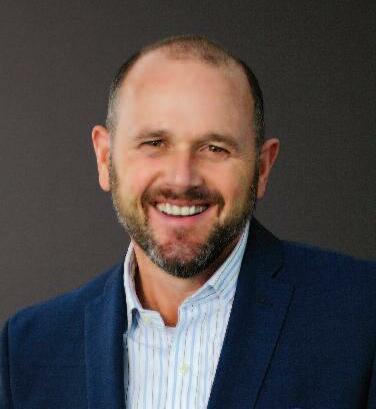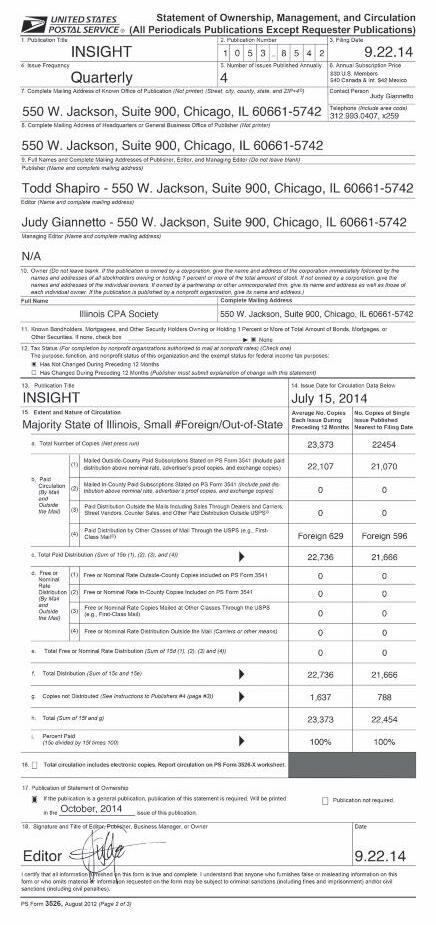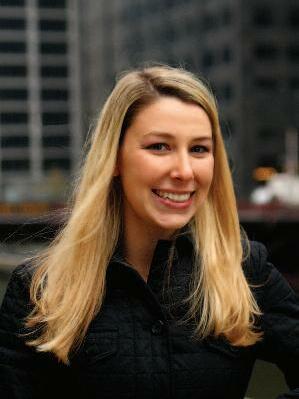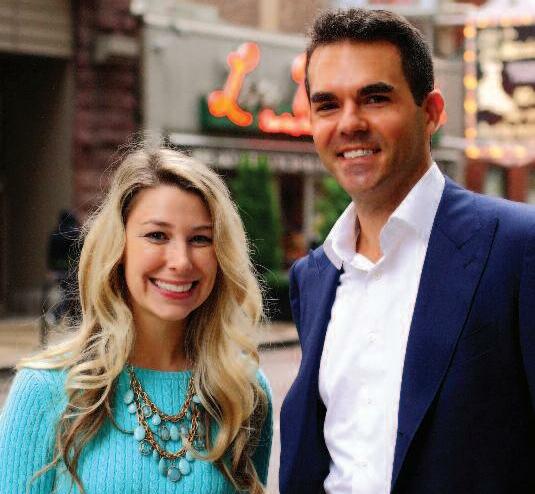





also in this issue... Offbeat Team Building 5 Companies That May Live Forever Make Millennial Clients Happy 3 Ethical Dilemmas & How to Face Them Volunteer Circuit Stardom Financial Wellness Payoffs THE NEXT CFO? WILL YOU BE Exploring the issues that shape today’s business world g icpas.org/insight.htm FALL2014 THE MAGAZINE OF THE









© 2014 Robert Half International Inc. An Equal Opportunity Employer M/F/D/V. 0914-9015 My payroll clerk is sick –1.800.803.8367 roberthalf.com roberthalf.com/salarycenter.

SAVE BIG MONEY with Alliant’s low auto rates NEW as low as 1.99 APR1 % USED as low as 2.24 APR1 % Your ILCPA membership provides access to some great benefits including great rates on savings and loans for cars, homes, education and more from Alliant Credit Union. APPLY TODAY... • Visit www.alliantcreditunion.org • Call 800-328-1935 (1) APR=Annual Percentage Rate. Alliant rates as of 10/01/2014. Loan approval, APR and downpayment required and other terms and conditions based on LTV (Loan to Value), payment method, creditworthiness, collateral (including age of vehicle), and the term of the loan. Advertised rates include automatic payment option. Rates are 0.4% higher without automatic payment option. Refinancing of loans from other lenders is available. Member is responsible for any fees associated with transferring of title. Rates are 1% higher for refinancing an existing Alliant loan. Financing available in all 50 states. All loans are subject to approval. Rates, terms and conditions are subject to change. You must be 18 or older to apply. We may not extend credit to you if you do not meet Alliant criteria. Allowable terms vary by loan amount. You must be or become a member of Alliant to apply. Applicant must meet eligibility requirements for Alliant membership. ©2014 Alliant Credit Union. All Rights Reserved. SEG826-R09/14

i n d e x 38 5 Companies with Staying Power These heavy hitters are no flash in the pan Companies with staying power have more than just serendipity to thank for their long-term success. 42 What Would You Do If... Three tough ethical dilemmas and how to do the right thing 18 Generations Got Millennial Clients? Here are eight ways to keep them, and keep adding them 22 Team Building 3 Offbeat Ways to Bond a Team Check your insecurities at the door and get ready for the weirder side of team building 26 Wellness Fit Wallet, Fit Mind Is financial fitness the missing piece of the corporate wellness puzzle? 28 Volunteering The Helper ’s Helper Four key steps will take your volunteer efforts from so - so to super successful 30 Legalities Tied & Bound A recent case brings the legality of restrictive employment covenants into question 4 Today’s CPA So Much to Do From Champaign to Peoria and Rockford to Moline, members talk to me about complexity. By ICPAS President & CEO Todd Shapiro 6 Seen Heard Sound bytes, sound advice and practical business tips 10 Forensics Insider The Voice Within Ignore it when you ’ re talking forensics and ethics, and you’ll suffer the consequences. By Brad Sargent, CPA/CFF, CFE , CFS, Cr FA, FABFA 12 Tax Decoded The Battle Over Taxes Sourcing and transaction locations are a few of the factors making taxes tough By Keith Staats, JD 14 PFP Advisor A Guide to Perfect Conduct New standards guide the practices of CPA financial planners well into the future By Mark J Gilbert, CPA/PFS 16 Capitol Report Goodbye Summer Hello General Election, legislative wins and regulation changes. By ICPAS VP of Government Relations Marty Green, Esq 48 Hype It 3 Tips for Flawless Public Speaking Sarah Herrmann’s must-read-must-know news for young accounting pros the regulars
topics lead stories 2 INSIGHT icpas org/insight htm F A L L 2 0 1 4 | w w w . i c p a s . o r g / i n s i g h t . h t m on the cover
’ s a tough climb to the top So how do you get from the rank and file to the corner office? Start with these three must-haves. 34 @IllinoisCPA #INSIGHTmag
hot
You in the C-Suite It
INSIGHT MAGAZINE
Publisher/President & CEO Todd Shapiro
Editor-in-Chief Judy Giannetto
Art & Layout Design Judy Giannetto
Production Design Rosa Garcia
Assistant Editor Derrick Lilly
Photography Jay Rubinic, Derrick Lilly, Thinkstock
National Sales & Advertising Natalie DeSoto
YGS Group, 3650 West Market Street, York, PA 17404
P: 800 501 9571 x127 F: 717 825 2171
E: natalie desoto@theygsgroup com
Circulation Carl Siska
Editorial Offices: 550 W Jackson Boulevard, Suite 900, Chicago, IL 60661
ICPAS OFFICERS
Chairperson, Daniel F Rahill, CPA, JD, LL M FGMK, LLC
Vice Chairperson, Edward J Hannon, CPA, JD Quarles & Brady LLP
Secretary, Scott D Steffens, CPA Grant Thornton LLP
Treasurer, Mary Lou Pier, CPA Pier & Associates, Ltd
Immediate Past Chairperson, William P Graf, CPA Deloitte & Touche LLP
ICPAS BOARD OF DIRECTORS
Linda S Abernethy, CPA, McGladrey LLP
Jared J Bourgeois, CPA, Mesirow Financial Consulting, LLC
Rosaria Cammarata, CPA, CME Group, Inc
Rose G Doherty, CPA, Legacy Professionals LLP
Eileen M Felson, CPA, CFF, PricewaterhouseCoopers LLP

Gary S Hart, CPA, MBA, Gary Hart & Associates, Ltd
Lisa A Hartkopf, CPA, Ernst & Young
Margaret M Hunn, CPA, CFE, CFF, CITP, Rozovics Group, P C
David V Kalet, CPA, MBA, BP Products North America, Inc
Thomas B Murtagh, CPA, JD, Wolf & Company LLP
Marcus D Odom, PhD, CFE, CPA (inactive), Southern Illinois University
Floyd D Perkins, CPA, Ungaretti & Harris
Kelly Richmond Pope, Ph D , CPA, DePaul University
Mark F Schultz, CPA, Dugan & Lopatka CPAs, P C
INSIGHT is the official magazine of the Illinois CPA Society, 550 W Jackson, Suite 900, Chicago, IL 60661, USA Its purpose is to serve as the primary news and information vehicle for some 24,000 CPA members and professional affiliates Statements or articles of opinion appearing in INSIGHT are not necessarily the views of the Illinois CPA Society The materials and information contained within INSIGHT are offered as information only and not as practice, financial, accounting, legal or other professional advice Readers are strongly encouraged to consult with an appropriate professional advisor before acting on the information contained in this publication It is INSIGHT’s policy not to knowingly accept advertising that discriminates on the basis of race, religion, sex, age or origin The Illinois CPA Society reserves the right to reject paid advertising that does not meet INSIGHT’s qualifications or that may detract from its professional and ethical standards The Illinois CPA Society does not necessarily endorse the non-Society resources, services or products that may appear or be referenced within INSIGHT, and makes no representation or warranties about the products or services they may provide or their accuracy or claims The Illinois CPA Society does not guarantee delivery dates for INSIGHT The Society disclaims all warranties, express or implied, and assumes no responsibility whatsoever for damages incurred as a result
icpas org/insight htm | FALL 2014 3
four
year, in Spring,
© 2014 No part of the contents may be reproduced by any means without the written consent of INSIGHT Permission requests may be sent to: Publications Specialist, at the address above Periodicals postage paid at Chicago, IL and at additional mailing offices POSTMASTER: Send address changes to: INSIGHT, Illinois CPA Society, 550 W Jackson, Suite 900, Chicago, IL 60661, USA Sign up today! Visit www.icpas.org or call 800.993.0407, option 4. VALUE For only $199 you get 40 hours of onDemand education at less than $5 per credit hour. Earn those valuable CPE credits you need before the 2015 reporting year ends. Premier onDemand education from the organization you know and trust. TIMELY QUALITY
One low, flat rate of only $199 for ICPAS members. ($249 for non-members)
40 hours of onDemand education to take anytime and anywhere.
Special offer good through September 30, 2015.
Over 100 interactive courses in our OnDemand catalog.
of delays in delivering INSIGHT INSIGHT (ISSN-1053-8542) is published
times a
Summer, Fall, Winter, by the Illinois CPA Society, 550 W Jackson, Suite 900, Chicago, IL 60661, USA , 312 993 0407 or 800 993 0407, fax: 312 993 7713 Copyright
•
•
•
•
{Follow Todd on Twitter @Todd ICPAS}

{Watch Todd’s CEO Video Series on YouTube}
So Much to Do
From Champaign to Peoria and Rockford to Moline, members talk to me about complexity. For many, it’s the #1 issue they face today.
CLIENTS AND COMPANIES ARE ASKING CPAS TO DO MORE AND MORE NOT ONLY PUTTING IN MORE HOURS, BUT ALSO
This isn't a new trend; for years we've been saying that CPAs are trusted business advisors The change is that the demand to be a strategic business partner is greater than ever and the issues grow more complicated by the day
And so, in this ever-changing, increasingly complex world, what skills and competencies do you need to fulfill this role? In my opinion, it takes a set of very specific attributes, including:
n Strategic and critical thinking
n High-level communication skills
n Being attuned to broad business issues
n Staying technologically up-to-date
n Leadership ability
n A commitment to lifelong learning
Strategic and critical thinking skills in particular are vital. We have more data at our fingertips than ever before and our companies and clients expect us to turn that data into knowle d g e t h a t c a n b e u s e d a s a c o m p e t i t i v e a d v a n t a g e a n d a means to move a business forwards
Mastering the data is only part of the equation, however Successful CPAs will grasp a project, factor in external circums t a n c e s a n d a n t i c i p a t e o u t c o m e s . G u i d i n g c l i e n t s a n d c u stomers from point A to point B is no longer good enough We now need to lead them from point A all the way to point Z.
The way we communicate information and communicate with each other is changing fundamentally, too. The volume of data available has put a premium on being able to present content succinctly and quickly identify its impact on a business Added to that, technology has revolutionized the way b u s i n e s s e s i n t e r a c t w i t h c u s t o m e r s , s t a f f s a n d e a c h o t h e r, thanks in large part to social media
The business world has become not only more complex, but also more interconnected. PESTER is the acronym used to describe the Political, Economic, Social, Technological, Environmental and Regulatory factors at play today. Most if not all
opportunities need to look at the facets of PESTER to ensure success For example, businesses are expected to have a favorable social impact, be environmentally friendly, have a positive economic result and meet regulatory guidelines CPAs attuned to broad business issues will be looked to and valued for their input
A l l t h e s e c o m p e t e n c i e s r e q u i r e u s t o b e t e c h n o l o g i c a l l y adept Yes, technology is impossible to keep up with but critical in moving forward At the Society’s Midwest Accounting and Finance Showcase this year we showed a video that discussed “the Internet of things” the future of data, information and connections over the Internet. Well, that future is now. If we are to thrive as trusted business advisors, we'll need to continually adapt to technology. There is no alternative. Furthermore, it’s common for many organizations to have up to four generations in the workplace at the same time. With that comes differing motivation, expectations, styles of learning and work methods Effective and adaptable leadership is critical in developing a collaborative team
Lastly, lifelong learning has been a pillar of the CPA profession for a very long time. We need to move back towards competency rather than just earning CPE, however And that means changing the nature of continuing education to adapt to an individual's specific learning needs and career path The future is now you will learn what you need to know, when you need to know it and how you want to learn it
Yes, the future is bright for CPAs fulfilling the role of trusted business advisor, yet it will be more challenging than ever to maintain the skills, knowledge and competencies necessary to be the strategic business partner clients and the marketplace are calling for Visit www icpas org to learn how ICPAS can help with the
4 INSIGHT icpas org/insight htm
s s u e o f c o m p l e x i t y t h r o u g h i t s f o u r f u n d a m e n t a l p i l l a r s : Education, Advocacy, Connections and Information
i
I N S I G H T S & S O C I E T Y N E W S F R O M I C PA S P R E S I D E N T & C E O TO D D S H A P I R O today ’sCPA
GIVING MORE STRATEGIC BUSINESS ADVICE.
GET THE PICTURE WHOLE
Introducing
Checkpoint Catalyst
TM
The fastest and most efficient way to research even the most complicated tax issues.
Checkpoint CatalystTM provides the clarity, color and context you need to quickly see the whole picture. It connects the dots between federal, state and U.S. international tax implications with multiple expert perspectives and embedded tools and diagrams, so you can take action with confidence and ensure you don’t miss a thing.
Jumpstart your research process with Checkpoint Catalyst.
Get results more easily, more rapidly and more accurately than with any other resource.
CheckpointCatalyst.com

© 2014 Thomson Reuters/Tax & Accounting. Checkpoint Catalyst is a trademark of Thomson Reuters and its affiliated companies. All Rights Reserved.
SEEN HEARD
68%
Millennials who expect their standard of living before retirement to be bet ter than that of their parents. (wells fargo)
TRENDWATCH Leadership Pipelines in Focus
In a recent global Right Management survey of 2,200 senior HR leaders, 46% said leadership development is their top priority, but a mere 13% said they have confidence in the strength of their leadership pipelines to fill critical openings
Specifically among U S participants, 48% reported that we’ll see increased spending on talent management initiatives aimed at developing leaders and building stronger talent pipelines HR leaders in China/Hong Kong (88%), India (77%), Brazil (75%) and the United Kingdom (45%) also plan to invest heavily in such programs
Perceived talent shortages, naturally, are driving these investments Right Management ’ s May 2014 Talent Shortage Survey found that 36% of employers globally are experiencing difficulty filling open positions due to a lack of available talent with the right skills for key positions
Current Issues:
Tech is Top of Mind
PricewaterhouseCoopers (PwC) usually gets a bunch of different responses when it asks business leaders about their primary focus areas, but this year was different U S CEOs are lasering in on technology, with 86% citing technological advances as the global trend that will most transform their businesses. Even those CEOs who ranked other megatrends (like urbanization and demographic shifts) as more transformative agreed that disruptive technologies would be a powerful change agent over the next five years
The top 10 techs global IT and business leaders are investing in for growth include:
(1) Business analytics 44%
(2) Socially enabled business processes 41%

(3) Mobile customer engagement 39%
(4) Cybersecurity 39%
(5) OnDemand biz & tech services 25%
(6) Sensors 20%
(7) Robotics 15%
(8) Battery & power technologies 15%
(9) 3D printing 11%
(10) Wearable computing 6%
Fast Track to Biz Success
Developing a successful business is hard work But maintaining success may be the hardest job of all Chief Executive offers these four tips for sustaining your business’ growth momentum
(1) Have a Clear Value Proposition
Make your value proposition concise and consistent, and make sure it differentiates you from the competition
(2) Evolve, Expand or Disrupt
Quickly respond to changes in customer needs, shifts in your industry, and new opportunities as they arise
(3) Grade Your Talent
Top performers need to know you have a growth plan for them
(4) Measure Ever ything
Capture feedback and data from all key audiences, including staff and customers
6 INSIGHT icpas org/insight htm
N E W S B Y T E S , S O U N D A D V I C E A N D P R A C T I C A L B U S I N E S S T I P S

CHICAGOLAND’S EXPERTS IN FINANCIAL RECRUITING AND STAFFING At Accounting Principals and Parker + Lynch, we use our intimate understanding of the local job market, salary trends and business climate to connect great talent to great companies across the Chicagoland area every day. To learn how we put the right accounting and finance talent in the right positions, contact us today. accountingprincipals.com parkerlynch.com Chicago 312.583.9264 | Deerfield 847.607.0550 | Oakbrook Terrace 630.792.1660 | Schaumburg 847.397.9700
FORMERLY JACKSON WABASH
FORMERLY GARELLI WONG
HOT TOPIC
Social Responsibility For All
Most business leaders think that only big corporations need to worry about social responsibility, but that ’ s a too common misconception, says The Vianova Group The consulting firm stresses that social responsibility is no longer optional for small- and medium- sized enterprises Here are three reasons why:
Employees want it : Real commitments to social and environmental responsibility help to engage and energize employees, which then helps to build a sense of community and teamwork in the organization
Customers expect it : A recent study shows that more than 90 percent of consumers are more likely to trust and be loyal to socially responsible businesses than they are to companies that aren’t

It saves money: Implementing environmental measures to reduce energy and water usage are proven to add to the bottom line
How To: Detect & Deter Fraud
Fraud is everyone ’ s responsibility financial executives, boards of directors, auditors and employees, among others At least that ’ s what public accounting and consulting firm Crowe Horwath LLP says, pointing out that while complacency is one of the biggest invitations to fraud, professional skepticism could be the biggest solution Crowe’s white paper, Skepticism: A primary weapon in the fight against fraud, suggests these five fraud-fighting strategies:
(1) Be the independent reviewer: Continuously challenge your beliefs and risk assessments.
(2) Resist complacency: Question whether you ’ re placing undue weight on prior risk assessments or discounting evidence inconsistent with your expectations
(3) Be aware of pressure: Pay particular attention to pressure to truncate risk assessment procedures or make unwarranted assumptions to beat time constraints and deadlines.
(4) Understand the evidence: Identify and assess audit risks from multiple perspectives, using multiple sources of evidence
(5) Question evidence reliability: Know that internal documents may be less reliable than external ones
U.S. CEOs who say they’re “pret ty sure” their companies’ revenues will grow this year. (PwC)
Are Bad Manners Stunting Your Career Growth?
It’s lonely at the top for a reason, says a recent A ccountemps survey Eighty-five percent of survey respondents said being courteous to coworkers positively impacts a person's career prospects, but 70% also said that people become less courteous as they climb the corporate ladder That’s not to say that bad manners exist only in the executive office, however A ccording to the survey, leading pet peeves include using a speakerphone or talking loudly on the phone (36%), loitering or talking around a colleague's desk (23%), eating foods that have strong odors (15%), keeping a messy or cluttered workspace (14%) and leaving the phone ringer on loud (8%)
8 INSIGHT icpas org/insight htm SEEN HEARD
89%
1,154 Illinois CPAs who took part in 2014’s CPA Day of Service, originally launched by the Illinois CPA Society in 2010.



forensics insider
The Voice Within
Ignore
c o u r s e o f m y c a r e e r i s t h a t forensic accountants have an innate ability to process large amounts of data and make instant analyses of very complicated data sets. We also seem to have instincts that protect us from harm and guide us when we encounter conflicting information let’s call this “the voice within,” which most people simply choose to ignore
When I offer this up to accounting students, however, I’m often met with some skepticism Then I ask them this: “A close and trusted friend approaches you with an investment opportunity. They tell you that you can expect returns in excess of 20 percent and that you can invest as much as you want. Do you make this investment?”

“Of course not!” they answer They can tell this is a trick question from a mile away When I tell them that 100 percent of them will do this, they scoff in disbelief
Ever hear of Bernie Madoff? Some of the most successful and sophisticated investors on the planet gave millions to Uncle Bernie. The question is, what is it that would compel someone to completely ignore their voice within and barge ahead?
Sociologists, psychologists and criminologists have studied the causes and effects of fraud for decades and they differ in their assessments, but the bottom line is, “we all want ” We all want more money and possessions, job security and acceptance to the point that we’ll disregard our own welfare. If we’re embroiled in litigation, we may seek vindication, retribution or justice, and the desire for justice may outweigh the rational ability to analyze a situation objectively from all perspectives and consider possible outcomes
Gerald L Pauling, II, Esq is a partner with the law firm of Seyfarth Shaw in Chicago His practice focuses on employment litigation and labor and employee relations, and he also provides advice, training and counseling to clients regarding employment policies and practices and diversity issues. Paul-
ing’s clients have included some of the largest organizations in the world, and he’s seen firsthand what happens when they ignore the voice within.
“Instinct, and 20-plus years of experience practicing law, no longer allows me to view any case, situation or fact pattern as a ‘slam dunk ’ A layup maybe; but true slam dunks are quite f e w a n d f a r b e t w e e n , ” P a u l i n g e x p l a i n s “ C l i e n t s a n d t h e i r c o u n s e l n e e d t o l i s t e n t o t h e i n n e r v o i c e t h a t o u g h t t o b e telling them there are two sides to every story, at least two counterpoints to every argument, and unknown facts that may later come to light Clients and lawyers put themselves at risk when they ignore the voice that begs them to think critically, even pessimistically, about their case and all of the possible outcomes This ignorance can lead to results that are unfavorable to the client and unexpected by the client. None of my clients like surprises ”
I’ll offer you a simple piece of advice: If you have any hesitation about a situation, then hesitate There’s a reason you’re feeling what you feel Stop and listen to your voice within Ask yourself why you’re so committed to moving forward when red flags are waving right at you The sad truth often lies in the wants. If we want something badly enough, we’ll ignore all the warning signs, good counsel and inner voices to get it
I’ll share this cautionary tale from my own past. I was at a new firm and my colleagues asked me to interview a candid a t e f o r a s t a f f p o s i t i o n , w h o I k n e w t h e y q u i t e f a v o r e d I wasn’t so impressed, but wanting to fit in and be accepted I agreed to the hire Within 30 days it was evident that something was seriously wrong. Further scrutiny revealed that this person had falsified the majority of their resume A fraudster victimized me, all because I wanted to be accepted by others me, the new head of the forensic practice It was a lesson that I learned the hard way
10 INSIGHT icpas org/insight htm W h a t I ’ v e d i s c o v e r e d o v e r t h e
it when you’re talking forensics and ethics, and you’ll suffer the consequences.
BRAD SARGENT, CPA/CFF, CFE , CFS, CR.FA, FABFA, THE SARGENT CONSULTING GROUP
BEING
BACK ON COLLEGE CAMPUSES AROUND THE GREAT STATE OF ILLINOIS AND SPEAKING WITH ACCOUNTING STUDENTS HAS ME WONDERING EXACTLY WHAT IT MEANS TO “THINK LIKE A FORENSIC ACCOUNTANT.”
We can all look back on lessons from our lives and find paths taken that led to bad outcomes. Hindsight is 20-20, and it’s easy to think about the would haves, could haves and should haves
My sincere hope is to focus on a proact i v e r e s p o n s e w h e n I r e c e i v e c o n f l i c t i n g data I’ve tried to build in some stopgap measures in my professional and personal life; I have a spouse and close friends who I trust intrinsically to tell me their honest o p i n i o n s , a n d I h a v e s e r v i c e p r o v i d e r s (accountants and attorneys, for example) whom I pay to provide counsel
However, when I want something and I know that my trusted advisors will likely a d d v o l u m e t o t h e v o i c e w i t h i n , I o f t e n choose not to share the full details or to exclude them completely before committing to action Irrational? Absolutely, but it’s also very, very human How often have you offered advice and counsel to clients o r c o l l e a g u e s a n d w a t c h e d t h e m c o mpletely ignore you and forge ahead?
Daniel H. Minkus, Esq. is a member in Clark Hill's Birmingham, Mich law office, where he practices in the Corporate Practice Group and concentrates in the areas of business and real estate He has significant experience advising and assisting clients w i t h o n g o i n g b u s i n e s s n e e d s , i n c l u d i n g issues often faced when entering into or t e r m i n a t i n g r e l a t i o n s h i p s w i t h t h i r d p a rties. He offers this perspective:
“Many businesspeople have very good instincts, especially about their industry, and these instincts are worth heeding. When something doesn’t look right, it usually isn’t Ignoring the concern in favor of proceeding with haste rarely ends up saving time in the long run An ounce of prevention is truly worth a pound of cure, and listening to one’s instincts often provides that preventative measure or at least a more critical look at an open issue or challenge I have seen buyers of businesses get so caught up in the momentum of the acquisition that they ignore their usual good instincts and critical analysis in favor of getting the deal done. Often this results in costly expenditures after the deal closes expenditures that could have and should have been at the expense of the seller. Not only can failing to listen to your instincts result in added costs, it can also lead to added time and effort to address issues that could have been addressed early in the process ”

If I can push you in a positive direction just once, the next time you’re faced with one of these situations, you’ll choose a new course and listen to your voice within.
About Brad Sargent
Brad is the managing member of The Sargent Consulting Group, LLC, which specializes in forensic accounting and financial investigations. He is a frequent lecturer and chair emeritus of the American Board of Forensic Accounting, and serves on the American Bar Association, Section of Litigation, Expert Witness Committee and Criminal Justice Section, White Collar Crime Committee He is a member of the Association of Certified Fraud Ex-
aminers, the Association of Certified Fraud Specialists and the Association of Insolvency and Restructuring Advisors A member of the Illinois CPA Society since 2002, Brad has served on the Committee Structure & Volunteerism Task Force, the Fraud Conference Task Force (which he chaired from 2009-2010 and 2012-2013) and the Strategic Planning Committee (which he chaired from 20112013) Share questions and comments with Brad at bsargent@scgforensics.com.
icpas org/insight htm | FALL 2014 11
tax decoded
The Battle Over Taxes
Sourcing and transaction locations are a few of the factors making taxes tough.
Because tax increases are politically unpopular especially with an election approaching tax base “modifications” are the go-to for change, and corporate income taxes are always an attractive candidate
Before going any further, I’ll give you a few corporate income tax basics I’ll warn you, it’s a complicated topic
Illinois’ income tax is a typical state income tax imposed on the net income of corporations It begins with federal taxable income that is subject to a series of statutory additions and subtractions

Many corporations are located and operate in more than one state Income from ordinary business activities, commonly known as “business income,” is divided among the states in which the corporation is taxable. Certain income earned outside of ordinary business activities, “nonbusiness income,” is generally allocated to the state in which the corporation’s commercial enterprise is based
Unfortunately, states don’t use uniform formulas for apportioning a multistate corporation’s business income Illinois, for example, compares a corporation’s sales in Illinois to its sales everywhere, while other states may compare the corporation’s property, payroll and sales in the state to its property, payroll and sales elsewhere. These differences cause imbalances in taxable income across states, and create state-specific advantages and disadvantages.
Here’s an example: By comparing sales and ignoring property and payroll, Illinois provides an advantage to Illinois-based companies Essentially, out-of-state corporations pay higher taxes to Illinois than they would under a formula that takes property and payroll into account From a political standpoint, it’s always easier to tax out-of-state companies
Adding complexity is the fact that income from different sources carry different division rules Income from real property (land) is generally sourced to the location of that property. For example, a corporation with rental income from a building in Illinois will source that income to Illinois. On the other hand, income from the sale of tangible personal property will be sourced to Illinois only if the property is shipped to a purchaser in Illinois While this seems simple enough, I should tell you that there’s a page full of regulations discussing the basics of when a purchaser in Illinois is considered to be the recipient of shipped tangible personal property Sourcing of sales gets even more complicated when dealing with intangible items Patents, copyrights, trademarks and the like have their own special sourcing law, as do receipts from t h e s a l e o f t e l e c o m m u n i c a t i o n s s e r v i c e s a n d b r o a d c a s t i n g services, etc. Additional rules apply to the sourcing of other more general types of services These services are sourced to Illinois if they are received in Illinois commonly referred to as “market-based sourcing ” Defining “received” is a complicated matter so complicated, in fact, that the Illinois Department of Revenue has yet to adopt regulations to implement the legislative changes that occurred in 2008 Proposed draft r e g u l a t i o n s w e r e c o n t r o v e r s i a l a n d r e c e i v e d a s i g n i f i c a n t amount of criticism As a result, the Department never went forward with them.
In addition to determining how to divide income between states, state laws have to decide how to tax income generated by a group of related companies Some states, like Illinois, group together related corporations for purposes of filing and reporting income, while other states treat each legal entity separately
12 INSIGHT icpas org/insight htm
KEITH STAATS, JD, GRANT THORNTON STATE AND LOCAL TAX (SALT) PRACTICE
ILLINOIS SAW NO MAJOR TAX CHANGES COME OUT OF ITS SPRING LEGISLATIVE SESSION, BUT THE SAME ISN’T TRUE FOR EVERYONE STATES ACROSS THE NATION ARE ONLY MARGINALLY GROWING THEIR REVENUE BASES, AND IN MANY INSTANCES EFFORTS TO COVER EXPENSES ARE FALLING SHORT, FORCING THEM TO LOOK FOR ADDITIONAL REVENUE STREAMS.
Certain related groups of “taxpayers/persons” are defined as “unitary business groups” under Illinois law
By treating corporations that are members of the same unitary group as a single taxpayer and requiring combined filing, Illinois reduces the opportunity for taxpayers to decrease their Illinois taxes through various corporate structures.
With that as background, I’ll turn to some significant state corporate income tax legislation enacted last spring
New York has enacted extensive sourcing guidelines for many different types of transactions, like market-based sourcing for sales other than those of tangible personal property. Receipts from services will be s o u rc e d b a s e d o n a c u s t o m e r l o c a t i o n h i e r a rc h y, specifically starting with where the customer receives the benefit of the transaction And mandatory unitary combined reporting has been enacted, replacing the current combined reporting standards, including the substantial intercorporate transactions requirement.
Rhode Island, too, has big changes coming in the year ahead. The state will now require corporations that are part of a unitary business to file a combined return Rhode Island also enacted a single-sales-factor a p p o r t i o n m e n t i n t h e p l a c e o f t h e c u r r e n t e q u a l l y weighted three-factor formula Market-based sourcing was adopted and the state’s corporate income tax rate was reduced.
District of Columbia budgetary legislation enacts a single-sales-factor apportionment, effective for tax years beginning after December 31, 2014 Legislation also has detailed both sourcing rules on the sale of services and market-based sourcing for the sale of items other than tangible personal property
All in all, corporate income tax is a complex topic, and a source of constant tension between states that wish to maximize collections, while limiting the tax b u r d e n o n i n - s t a t e c o r p o r a t i o n s A t t h e s a m e t i m e , c o r p o r a t i o n s a r e c o n s t a n t l y t r y i n g t o m i n i m i z e t h e a m o u n t o f i n c o m e s u b j e c t t o s t a t e t a x T h e r e a r e bright and creative people on both sides, and the battle never stops
About Keith Staats
Keith is a director in Grant Thornton’s State and Local Tax (SALT) Practice in Chicago, and has been involved in tax planning, consulting and dispute resolution in all areas of state and local tax He has served as General Counsel of the Illinois Department of Revenue (IDOR), was involved in the development of Illinois tax policy, reviewed and evaluated all tax-related legislation proposed by the Illinois General Assembly, contributed to the drafting of all tax legislation proposed by the Governor, and was a member of the IDOR Informal Conference Board He has represented taxpayers before both the Informal Conference Board and the Board of Appeals Keith is a professional affiliate member of the Illinois CPA Society, and is a member of the American Bar Association, the Illinois State Bar Association, the Chicago Bar Association and the Board of Directors of the Civic Federation of Chicago Got questions or feedback for Keith? Reach him at keith staats@us gt com
Spend the morning networking with your peers and participating in a panel discussion featuring the 2014 Women to Watch Award winners:
EXPERIENCED LEADER
Angela H. Hickey
Executive Director, Levenfeld Pearlstein, LLC


EXPERIENCED LEADER
Kristie P. Paskvan
CFO, Mesirow Financial and President, Retirement Plan Advisory, Mesirow Financial Investment Management

EMERGING LEADER
Annie Kolman
Senior Manager, Ernst & Young, LLP

These three exceptional women will share their strategies for finding work/life balance, managing multiple generations in the office, and supporting the advancement of women in the accounting profession. Have your questions ready!
Date: Thursday, November 13, 2014
Time: 7:30AM -10:00AM
Place: The Standard Club
320 S. Plymouth Court, 5th Floor Ballroom Chicago, Illinois
CPE: 1 Credit Hour
FOS: 1 Personal Development


Code: C41807

Cost: $39 Per Person
TO REGISTER: Call 800.993.0407 or visit www.icpas.org/women.htm.
The Illinois CPA Society’s Women’s Executive Committee and the AICPA’s Women’s Initiatives Executive Committee together recognize and celebrate women who have made notable contributions to the accounting profession, their organizations, and the development of women as leaders.
icpas org/insight htm | FALL 2014 13
MARK J GILBERT, CPA/PFS, REASON FINANCIAL ADVISORS, INC

A Guide to Perfect Conduct
New standards guide the practices of CPA financial planners well into the future.
THANKS TO RECENTLY ISSUED AICPA GUIDANCE, CPA FINANCIAL PLANNERS ADVISING INDIVIDUALS, FAMILIES AND BUSINESS OWNERS IN THE AREAS OF ESTATE, RETIREMENT, INVESTMENTS AND INSURANCE NOW HAVE A ROADMAP TO GUIDE THEM IN PROVIDING THEIR PERSONAL FINANCIAL PLANNING (PFP) SERVICES COMPETENTLY AND CONFIDENTLY
The AICPA’s Statement on Standards in Personal Financial Planning (PFP) Services No. 1 (the Statement) became effective on July 1, 2014 While binding to AICPA members who practice or may otherwise be viewed by the public as personal financial planners, the Statement’s reach is broader given the fact that CPAs are regulated by their state boards of accountancy
According to AICPA research, most state boards include PFP in their definition of accountancy activities, and therefore have jurisdiction over CPAs practicing in this area. That said, it’s likely that state boards will look to the Statement as authoritative in this practice area regardless of specific or blanket adop-
The objectives of the Statement are clear cut: To provide members with authoritative guidance in the practice of PFP a n d e s t a b l i s h e n f o rc e a b l e s t a n d a r d s t h a t a s s i s t m e m b e r s i n f u l f i l l i n g t h e i r p r o f e s s i o n a l r e s p o n s i b i l i t i e s . T h e S t a t e m e n t supersedes the de facto standard that is the AICPA’s Statement on Responsibilities in Personal Financial Planning Practice (SOR) SOR largely consists of best practices gathered over some 30 years of observing PFP activities performed by CPAs And with the growing demand for PFP services, there was a clear need to formalize CPAs’ responsibilities and ensure consistent delivery of services across the profession.
tion of other AICPA standards In Illinois, for example, nonAICPA member firms and sole practitioners are already required to follow AICPA professional standards in areas such as audit, accounting and peer review, so it’s reasonable to expect the same for those providing PFP services
But really, all CPAs who provide PFP services should understand and follow the Statement since its foundation is rooted in the AICPA’s Code of Professional Conduct, which the state boards of accountancy have based their own codes of professional conduct on
Through the Statement, the AICPA has defined how to deliver PFP services with integrity, professionalism, objectivity, competency and consistency It defines the nature of PFP services, as well as delineating when the Statement’s provisions are to be followed It describes a CPA personal financial planner ’s general professional responsibilities and stresses the importance of maintaining objectivity in PFP engagements. It addresses member responsibilities in the areas of ethics, knowledge of PFP, conflicts of interest and compensation disclosure. And, finally, it provides guidance for, and examples of, topics such as plan-
pfp advisor
14 INSIGHT icpas org/insight htm
“ While the Statement sounds like it should only matter to CPAs practicing in financial planning, the truth is it benefits all CPAs in terms of outlining values and conduct in CPA-client relationships. Essentially, this is the AICPA’s first authoritative pronouncement on how members should be delivering PFP services.”
ning the PFP engagement, obtaining and analyzing information, developing and communicating recommendations, PFP implementation engagements, PFP monitoring and updating engagements, and working with and using advice provided by other service providers

The Statement doesn’t set out to turn all CPA financial planners into clones, however It purposely remains mum on specific methodologies used, recognizing that individual planners have their own unique style when it comes to interacting with clients, preparing work product, delivering observations and recommendations to clients, and documenting their findings.

While the Statement sounds like it should o n l y m a t t e r t o C PA s p r a c t i c i n g f i n a n c i a l planning, the truth is it benefits all CPAs in t e r m s o f o u t l i n i n g v a l u e s a n d c o n d u c t i n CPA-client relationships.
Essentially, this is the AICPA’s first authoritative pronouncement on how members should be delivering PFP services to clients No other PFP self-regulatory organization’s standards presently carry the weight of state law behind them as this Statement is expected to do. It provides authoritative guidance built on the cornerstone of the CPA profession the public interest and aligns with the AICPA Code of Professional Conduct, which upholds the highest levels of integrity, professionalism, objectivity and competence

A s p e c i a l t h a n k yo u t o A n d r e a M i l l a r a n d Sarah Bradley of the AICPA Personal Financ i a l P l a n n i n g D iv i s i o n f o r t h e i r t e ch n i c a l assistance in preparing this column
























For more on the AICPA’s Statement on Standards in Personal Financial Planning Services, visit www aicpa org/pfp/standards






















A bout Mar k J. Gilber t















Mark is a principal in the financial planning and investment management firm of Reason Financial Advisors, Inc , with offices in Northbrook and Naperville, Ill He has been a CPA and member of the Illinois CPA Society since 1982, and was awarded the AICPA’s PFS designation in personal financial planning in 1999 He currently serves on the ICPAS Finance & Treasury Management Committee and the Committee Structure & Volunteerism Task Force. Mark is frequently called upon as a media contact, and has appeared on WBBM (Channel 2), WLS (Channel 7), WGN (Channel 9) and WDCB (90 9 FM), speaking on financial planning topics He has also been quoted nationally in notable titles such as the Chicago Tribune, Wall Street Journal, Money and US News Reach Mark at mgilbert@reasonfinancial com

icpas org/insight htm | FALL 2014 15
Creep y Regulator Lands Shif cape ting wit ct nn ou as er conve al ca i e a as s, su i nal ssi o CEO t sid Pr A I of ir h , ahil an n co iona prof ful power ea ety’s c S the with sation m t ing sh trends the as ll n tive s per fresh a r a , irecto Board PAS th ity. mu r y an shi r . zri h s row t o ’s da o i S d To ram prog all includ t breakfa r t li om our dit : C Bre and Networking - 8:00AM Code | 2015 15, y Januar Ter Te Oakbrook s: F : t Q&A and Program - 9:30AM - 8:30AM | akfast 41827C41 : race Con and atreTheat Lane y ur Dr Suites, Glenview Wyndham Bre and Networking - 8:00AM Code | 2015 , 21 y Januar Glenview Code | 2015 22, y Januar Chicago O Lane, y ur Dr 100 r, Center, ference Glenview, , Ave Av Milwaukee N 1400 Program - 9:30AM - 8:30AM | akfast 41825C41 : 41826C41 : IL Terrace, Te akbrook IL Q&A and IL o, Q&A and m Chicago Plaza Crowne The Bre and Networking - 8:00AM v or 800.993.0407 call h town a for register To Chicag Madison, West 733 Metro, Progra - 9:30AM - 8:30AM | akfast www.icpas.org. isit area, your in all
capitol report
Goodbye Summer
Locally there are important decisions to be made All our statewide officers, members of the Illinois House and one-third of members of the Illinois Senate are up for election, and ballots will include referendum questions to amend the Illinois Constitution, as well as several advisory questions put forward by the General Assembly
Nationally, the mid-term elections serve as a bellwether for the 2016 Presidential Elections, and commentators are already predicting that Republicans will maintain control of the House of Representatives and may even take control of the Senate
While I won’t comment on who I think you should vote for, I will say that the CPA profession has had some very good wins with the Illinois General Assembly this year

F o r s t a r t e r s , t h e G o v e r n o r s i g n e d H o u s e B i l l 4 7 0 7 , t h e Accounting Act Trailer Bill, into law This legislation benefits the CPA profession by authorizing the Illinois Department of F i n a n c i a l a n d P r o f e s s i o n a l R e g u l a t i o n t o i s s u e p r o v i s i o n a l l i c e n s e s t o n e w l y r e l o c a t e d C PA s w h o p o s s e s s l i c e n s e s i n good standing in substantially equivalent states, and who have applied for an Illinois CPA license. The provisional license allows applicants to use the CPA title and to perform accountancy activities while their Illinois application is pending
ICPAS also worked with Senators Michael Connelly (R-21, Naperville) and John Mulroe (D-10, Chicago) in establishing clear legislative intent for House Bill 5503, which provides new transparency audit requirements for county and municipal governments And ICPAS supported the passage of House Bill 3405 sponsored by Senator Daniel Biss (D-9, Evanston), w h i c h a m e n d s t h e I l l i n o i s C o n s u m e r F r a u d a n d D e c e p t i v e
t t
a k e p a t e n t t r o l l i n g a n u n l a w f u l p r a c t i c e .
Finally, the Society was successful in playing defense on several measures to include employment non-compete legislation that would generally veer from industry practices.
Following the November election, the General Assembly w i l l r e t u r n t o S p r i n g f i e l d t o b e g i n a s i x - d a y Ve t o S e s s i o n Although the Governor has vetoed very few bills, the fate of t h e 2 0 11 Te m p o r a r y I n c o m e Ta x R a t e s s c h e d u l e d t o b e g i n sloping in January is a carryover from the Spring Session With t h e F Y 2 0 1 5 S t a t e O p e r a t i n g B u d g e t b e i n g b a s e d o n t h e assumption that these enhanced rates will continue, the General Assembly will either have to sustain the temporary rates or deal with a financial Armageddon and implement drastic budget cuts Let’s not forget that the Temporary Income Tax Rates originally passed during a lame duck session in 2011 with the support of many legislators who were leaving office Depending on the outcome of the gubernatorial election, it’s plausible that we’ll see this same play again Governor Quinn supports the continuation of the temporary tax rates, while his Republican opponent Bruce Rauner opposes the move In any case, November and December should be interesting as we monitor the General Assembly’s actions.
Elections aside, the Government Relations Office has been focusing on several issues on the regulatory horizon For example, the Illinois Department of Employment Security (IDES) implemented monthly employee wage reporting requirements in which we identified several material issues adversely affecting employers and firms Several payroll services firms helped us in flagging these issues, and we’ve shared them with the IDES director in the hopes of encouraging him to broadly exercise his waiver of penalty authority when there’s good reason.
16 INSIGHT icpas org/insight htm
P
a c t i
r
c e A c
o m
Hello General Election, legislative wins and regulation changes.
MARTY GREEN, ESQ , ICPAS GOVERNMENT RELATIONS OFFICE
WITH THE ILLINOIS STATE FAIR AND LABOR DAY SADLY BEHIND US, I THINK EVERYONE CAN AGREE THAT THIS SUMMER WENT BY WAY TOO FAST, ESPECIALLY WHEN YOU REALIZE THAT CAMPAIGN SEASON FOR THE UPCOMING NOVEMBER GENERAL ELECTION HAS KICKED INTO HIGH GEAR
{Follow us on Twitter @IllinoisCPA}
ICPAS also was named one of eight organizations that will serve on a new State Tax Preparer Commission created to study paid tax return preparer regulations The Commission’s charter specifies that a report will be made to the General Assembly by December 1, 2015, with recommendations for the appropriate scope of regulation for commercial tax return preparers, educational requirements and continuing education requirements. There are many moving parts to this issue, but we will actively work to educate members on IRS initiatives and preserve the CPA title
And finally, this summer marked the passing of former U.S. Senator Alan J Dixon, who served Illinois with great distinction as a member of the Illinois House and Senate and as the State Treasurer and Secretary of State. As an aide to former Governor Jim Edgar, I was fortunate to have met Senator Dixon in Illinois and Washington, D C He was always gracious and kind to whomever he met, and extremely humble both in and out of office. Senator Dixon served our state and nation well, and he will be missed I
n y o f y o u o v e r t h e s u m m e r months at Society chapter events and meetings, and I look forward to seeing you at the upcoming Town Hall Forums In the mean-

informed of what’s happening on the state and federal levels, and we’ve added a resources section for practitioners as well Check out all the information and resources at www.icpas.org.



About Mar ty Green
Marty is the Illinois CPA Society ’ s Vice President of Government Relations, working with the CEO and Board of Directors to oversee and implement the Society ’ s legislative and regulatory activities He also curates the Society ’ s monthly Capitol Dispatch, a digital digest of legislative news for Illinois CPAs Marty is a practicing lawyer, member of the Illinois Bar and a colonel in the National Guard He previously served as executive assistant attorney general for Illinois Attorneys General Lisa Madigan and Jim Ryan, and as director of the Governor ’ s Office of Citizens Assistance and assistant to the Governor for Public Affairs, both under Governor James Edgar. Marty holds a number of professional certifications and is admitted to practice before the state and federal courts He is the past president of the Western Illinois University Alumni Council and is an adjunct professor for the Department of Health Sciences Got questions or feedback for Marty? Reach him at greenm@icpas org
success possible

icpas org/insight htm | FALL 2014 17
a v e e n j o y e d v i s i t i n g w i t h m
t i m e , w e f r e q u e n t l y s h a r e i s s u e s o n o u r w e b s i t e t o k e e p y o u
h
a
CPA
Endowment Fund of Illinois make
“I am inspired by the pride CPAs have for the profession. Your support and recognition of others assures me that I chose the right career path.”
Kierra Smith - Scholarship Recipient
Make success possible. Donate today. www.icpas.org/annualfund.htm
Last year, the Fund awarded approximately $150,000 in support of tuition, textbooks, and the CPA exam to more than 100 of the most diverse and deserving accounting students across the state. This makes your profession’s charity unique among its peers.
Got Millennial Clients?
Here are eight ways to keep them, and to keep adding them
By Derrick Lilly
Born between 1977 and 2000, there are more than 80-million Millennials in the United States, and they present a golden opportunity for your firm.
“Attracting the next generation of clients is so important, but most experienced CPAs and financial advisors are all too happy to go about providing their services in the same old way,” says Rita Keller, president and founder of management and consulting firm Keller Advisors LLC
For most, “the same old way” means prospecting for clients in their 40s, 50s and 60s, who have established businesses or collected wealth. But Pershing Advisor Solutions research suggests that this pool of prospects will grow only 1 percent over the next decade, meaning that engaging the next generation of clients is more important than ever
“Ask yourself what happens when the next generation takes over the family business or inherits wealth Will they choose to work with you?” asks Keller “To win tomorrow’s business, today’s CPAs and advisors need to position themselves to be relevant and tech savvy ”
Here’s how
1. Start Fresh
Discard every preconception you have about Millennials To win them, you need to understand them
“A lot of professionals have this misconception that all Millennials are know-it-alls, feel entitled, a n d w o r s e W h a t M i l l e n n i a l i n t h e i r r i g h t m i n d would want to go to a CPA or financial advisor who
t h i n k s l i k e t h a t ? ” a s k s 3 4 - y e a r- o l d E r i c R o b e rg e , CFP and founder of BeyondYourHammock.com, a financial planning website that helps young professionals achieve their lifestyle goals “Being able to t a l k t o M i l l e n n i a l s a s e q u a l s i s k e y G e t t i n g i n t o their world and understanding what drives them, what motivates them, and what they’re committed
t o i s a h u g e p a r t o f c o n n e c t i n g w i t h t h e m T h e y want advisors who are interested in growing with them The relationship has to be based on working together, not on age.”
2. Start Early
Wells Fargo’s 2014 Millennial Study found that 57 percent of Millennials “look primarily to family as a trusted source for information to help them make financial decisions ” Here’s an opportunity engage your clients’ children
“If you only focus on your contemporaries, you run the risk of being identified as ‘daddy’s CPA’,” s a y s K e n n e t h G u i d r y, C PA , p r e s i d e n t o f P a n n e l l Kerr Forster of Texas, P.C. “But by making a meaningful connection with your clients’ children, they w o n ’t f e e l t h e n e e d t o i m m e d i a t e l y r e p l a c e y o u when they inherit the family business or wealth ”
This doesn’t mean soliciting their business right off the bat Instead, ensure they know you and are c o m f o r t a b l e s p e a k i n g w i t h y o u ; i n v o l v e t h e m i n discussions about things that may affect them, and always offer them the opportunity to contact you.
3 Look Internally
Guidry also suggests that firms make the right internal moves to attract next-generation clients.
“You can do this by making sure that you’ve got people involved with your accounts that are part of the next generation,” he says “In our 145-person firm, about 60 percent of our people are under the age of 30 We strive to make sure our directors and m a t u r e p l a y e r s a r e i n v o l v i n g o u r y o u n g e r t e a m members as early as possible.”
“Young professionals can also focus on developing networks of peer business owners in their communities,” Keller adds

18 INSIGHT icpas org/insight htm
GENERATIONS

Program features include: • Coverage for a wide range of professional services • Up to $1,000,000 in financial protection • Full Prior Acts coverage available for qualifying firms • Extended Reporting Period (EPR) options • MyRiskAdvice™ — Interactive Risk Management helpline and website • Affordable, budget-friendly rates • Ability to purchase coverage online — pay by credit card 65095 (9/14) Copyright 2014 Mercer LLC. All rights reserved. AR Ins. Lic. #303439, CA Ins. Lic. #0G39709 In CA d/b/a Mercer Health & Benefits Insurance Services LLC ICPAS-SPONSORED: ACCOUNTANTS PROFESSIONAL LIABILITY INSURANCE FOR THE RISKS YOU FACE Net Ready to see how easy it can be to protect yourself and your firm? Get a quote today! Visit http://bit.ly/65095ICPAS or call 1-800-337-2621 for additional information.
“The importance of this is that Millennials are increasingly looki n g f o r a c c o u n t a n t s a n d a d v i s o r s w h o a r e c l o s e r t o t h e i r o w n ages,” says Roberge “They want somebody that they can trust will be around as long as they will ”
4. Partner Up
“Being proactive about building connections with young finance p r o f e s s i o n a l s i s a n o t h e r w a y t o g a i n M i l l e n n i a l c l i e n t s , ” s a y s Roberge. “If an older CPA or advisor reached out to me, I would definitely set up a meeting to hear what he or she had to say
“I probably spoke with 100 CPAs before finding a like-minded peer,” he continues “But now I have a go-to person that I trust to refer business to, meet clients through and bounce ideas off of This partnership is a huge plus for my clients, most of whom have never approached a CPA.”

5 Get Involved
“The whole concept of connecting with universities, serving on advisory boards and supporting startup incubators is an underappreciated opportunity for firms that have an appetite for attracting new business and young talent and clients alike,” says Guidry, whose firm supports many local business schools, entrepreneurial programs and startup incubators.
O f f e r i n g o n e e x a m p l e , G u i d r y ’s f i r m m e e t s a h o s t o f y o u n g entrepreneurs through its involvement with the world-renowned Rice Business Plan Competition
“As the accounting firm that tallies the scoring and results, our name and logo appears all over the place and we gain a lot of recognition amongst the contestants, judges, local business executives
and others,” he says. “Through interacting with them, we’re not only meeting the people forming new businesses, but we’re also meeting the investors in these ventures, so it’s really beneficial to us in meeting potential clients and interacting with referral sources ”
6. Get Online
Millennials are accustomed to accessing information and performing tasks on an anywhere, anytime basis. So naturally the best place to meet them is online.
“Millennials don’t always know what they need in an accountant or financial advisor, but when they want to learn, they hop online to read a blog or forum, listen to a podcast, or watch a YouTube video,” explains 29-year-old Joshua J Sheats, CFP, CLU, ChFC, CASL, CAP, RHU, REBC, and host of the daily Radical Personal Finance podcast.
“Besides having a great website, blog, podcasts or videos, social media can’t be overlooked,” says Roberge “I’d say that Facebook i s t h e m o s t e f f e c t i v e w a y t o r e a c h M i l l e n n i a l s , b u t L i n k e d I n , Google+ and Twitter can all be effective These sites let you showcase your expertise, educate viewers and drive traffic to your content. The point is that people want to see who you are before they talk to you.”
7 Ramp Up Tech
After wooing Millennials with your online presence, you’ll have to be able to service their needs online as well
“When young clients expect virtual office technology and older advisors and CPAs expect them to come in for face-to-face meetings for everything, that just doesn’t work,” says Roberge. “It’s too slow. Paperless offices, eSignature software, secure file sharing, video conferencing, cloud-based financial software, and virtual offices are becoming the things every professional needs ”
“Most Millennials don’t want to gather their documents, travel to an office, and sit down with you just to review and sign some forms,” adds Sheats. “Using online meeting services to share your desktop view with clients and mark it up online in real-time is much more effective than trying to do something in person anymore.”
8. Get the Price Right
While Wells Fargo points out that the percentage of Millennials using financial advisors has actually doubled since last year, to keep that trend going CPAs and financial advisors need to consider costs
According to the multinational banking and financial services company, the most common reason Millennials don’t use advisors is because they can’t afford them, which suggests there’s ample opportunity for financial services providers to win more Millennial clients with affordably priced advice
Launching fee-only virtual financial planning practices is how Roberge and Sheats are making these services more accessible to Millennials. “I didn’t want the overhead of a physical office space that I may not even use. I am location independent. Many of my clients I’ve only met through video conferences, so I can charge less for my services,” Roberge explains “I charge an engagement fee and a monthly retainer fee it’s like paying a gym membership or cell phone bill; it fits in their cash-flow cycle, it’s less of an impact on their savings, and they can engage me whenever and wherever they need to.”
“You have to match your service structure, your infrastructure and the economics of your firm to the opportunities that are out there,” Guidry adds And Millennials present a golden opportunity
20 INSIGHT icpas org/insight htm
We
Give us a call today so that we can start working to remove your selling headache
Selling Your Practice? Start selling right now. The Holmes Group Trent Holmes Toll Free: 800.397.0249 AccountingPracticeSales.com trent@accountingpracticesales.com
are different because we can produce the best results for YOU.
and to obtain the goal you desire.

CHICAGO | BLOOMFIELD HILLS | 866-717-1607 | www.cca-advisors.com If your clients require expert services, our Client Back Guarantee ensures our consultants are playing for your team. Gary Leeman, Walt McGrail, Harry Cendrowski, CPA/ABV CFF CGMA JD CPA CPA/ABV CGMA CFF CFE CVA CFD MAFF Working with consultants? Make sure your clients stay with Your Firm. Fraud Detection Risk Assessment Business Valuations Forensic Accounting Investigative Due Diligence Economic Damage Assessment Strategically consulting to build client relationships. Anniversary
3 Offbeat Ways to Bond a Team

Check your insecurities at the door and get ready for the weirder side of team building
 By Judy Giannetto
By Judy Giannetto
Imagine sitting naked in a Turkish bath with your executive team Bonding experience or the stuff of nightmares?
“ I w o r k i n J a p a n , a n d m y w o r s t t e a m - b u i l d i n g exercise has been taking a bath with my boss and supervisors, although only of the same gender. It’s called ‘naked relationships’ and is thought to build trust,” explains one professional in an article posted on The Fast Track. “The idea is that when you are naked, everyone is equal and you will feel free to d i s c u s s t h i n g s a n d j o k e a b o u t t h i n g s t h a t y o u wouldn’t in the office setting ”
Well, the intention is good anyway
From Bug Eating Relay events at a team-building camp in South Africa to Human Table Football in the UK, creative and often bizarre team-building programs are cropping up all over the place And this side of the pond is no exception.
Here are three programs perfectly tailored for outside-the-box thinkers who are all about the team
You Rock!
Share the stage with former members of Guns N’ Roses, Marilyn Manson, Cream, KISS and other legends of rock, and boost the collaborative potential of your team while you're at it
T h a t ' s t h e c o n c e p t b e h i n d R o c k ‘ n ’ R o l l

F a n t a s y C a m p ( R R F C ) , w h i c h p u t s t e a m s center stage (literally) to build camaraderie, p r o d u c t i v i t y a n d c r e a t i v i t y A s a n a d d e d bonus you get to strut around like Mick Jagg e r f o r a c o u p l e o f d a y s w i t h o u t a n y b o d y judging you for it
T h i s i s h o w i t w o r k s : P a r t i c i p a n t s a r e divided into teams of 5 to 20 Each team is a s s i g n e d a s e r i e s o f t a s k s t h a t h a v e t o b e c o m p l e t e d w i t h i n 2 t o 3 h o u r s . A n o t a b l e Rock Counselor is assigned to each team to serve as a mentor Which means you might find yourselves jamming with former Guns N’ Roses drummer Steven Adler, YES frontman Jon Anderson, KISS founding member P e t e r C r i s s , o r f i v e - t i m e G r a m m y w i n n e r Wynonna Judd, to name a few.
Rock Counselors guide their groups through the process of assigning roles, establishing timeframes, deciding on an approach to the tasks at hand and collaborating to achieve the ultimate goal: Rewriting the lyrics of a famous song written or performed by the Rock Counselor in question (Sweet Boss o' Mine anyone? Welcome to the Junket perhaps?)
Finally, the group performs its rock masterpiece u p o n s t a g e w i t h a f u l l b a c k - u p b a n d , c h o r e ographed routine and costumes The best of the best win awards in a variety of categories, and the whole experience closes with an un-Rock ‘n’ Roll debrief.
In case you think this is all fluff and nonsense, know that RRFC's list of clients is an illustrious one, featuring the likes of Kia Motors America, Fortune Magazine, Olympus and GE
"We contracted Rock ‘n’ Roll Fantasy Camp to engage our 220 executives in a half-day corporate training Rock ‘n’ Roll camp," says Lorenzo Simonelli, president and CEO of GE Oil & Gas "While I was skeptical at first, the planning, execution and final product made me a firm believer in their process for
TEAM BUILDING
22 INSIGHT icpas org/insight htm SHARE a PIC or VIDEO! Show us your fav team-building exercise in action @IllinoisCPA #teamCPA
Cetera Financial Specialists LLC, Member FINRA/SIPC 200 N. Martingale Road, Schaumburg, IL 60173 © 2014 Cetera Financial Specialists LLC 08/14 Truth is... CPAs and tax professionals are our business. We can help you grow yours. Cetera Financial Specialists is a wealth management firm with a difference. We are the leading growth consultant for tax and accounting professionals and CPA firms that have successfully integrated wealth management into their practices. We know your business, and truly understand what it takes for an independent like you to thrive in today’s ultra-competitive marketplace. Learn how we can help you maximize your value as your clients’ financial quarterback at response.cetera.com/ourbusiness or call us at 888.410.9444
delivering a high-quality, interactive and exciting team-building program "
Even the New Jersey Society of CPAs has gotten in on the act, explaining that, "The R o c k ‘ n ’ R o l l e x p e r i e n c e w a s a b i t o f a stretch for our typically conservative group, b u t ( R R F C ) d e l i v e r e d a n e x p e r i e n c e t h e y will not forget We had over 120 leaders participate in the camps and I know they were amazed at what they accomplished "
C a m p s a r e h e l d e i t h e r a t R R F C h e a dquarters in Vegas, or at the location of your choice Visit rockcamp com to learn more
Zombie Houdinis Wanted
Fans of The Walking Dead and Z Nation will really appreciate this one
It all starts with a terrible, terrible accident World-renowned brain surgeon Dr Oxy was pricked by a needle when researching a cure for a virus mutation Knowing what’s to befall him, he locks himself in a room, hides the key and throws together a bunch of clues, riddles and “Minute-ToWin-It” challenges. Before waving goodbye to the last vestiges of his humanity, Dr Oxy chains himself to the wall
Enter your team. You and up to 11 teammates mysteriously find yourselves locked in this very same room A clock is counting down from 60. Every five minutes a buzzer sounds and Dr Oxy’s chain gets a foot longer By the end of the 60 minutes Dr Oxy will be able to reach the door and all of you The team has to work together to find all the hidden clues, solve the riddles, beat the challenges, find the key and escape before becoming dinner
On a practical level, Trapped In A Room With A Zombie “recreates the stress and communication challenges that exist in the workplace by giving an intense goal to a team that they must meet within a certain deadline,” says Bucket List Productions LLC founder and Room Escape Adventures script creator Marty Lee Parker. “Without leaders, followers, group communication, thinking outside the box, problem-solving as a unit, listening, admitting you’re wrong, working together and effectively communicating, the team will fail in its mission,” he explains
“Nationally only 30 percent of the teams who attempt to escape make it out,” says Parker However, “Those who do show an excellent display of an efficient unit that q
leadership and they will run out of time O n e o f t h e m o s t i m p o r t a n t a s p e c t s t h a t teams realize is that by listening to everyone in the room, regardless of their position in the company, they are able to successfully escape their predicament.”
The program has proved extremely popular, with 12 show locations in the United S t a t e s ( i n c l u d i n g C h i c a g o ) , e a c h r u n n i n g 10 to 20 shows a week Branches in Seattle, Houston, Cleveland, Denver, Miami, To r o n t o , M a d r i d , L o n d o n a n d To k y o a r e scheduled to open by the end of this year
Who is this activity best suited for? “Anyone that a zombie would eat,” says Parker L e a r n a l l a b o u t e s c a p i n g z o m b i e s a t roomescapeadventures com
Flash Mobbing in the USA
If you’ve been living under a rock the last few years, then flash mobs might be a foreign concept Wikipedia defines them as “ a l a rg e g r o u p o f p e o p l e , w h o a s s e m b l e s u d d e n l y i n a p u b l i c p l a c e , p e r f o r m a n unusual and pointless act for a brief time a n d t h e n q u i c k l y d i s p e r s e ” A n d n o t h i n g says “team” quite like it
“Just like in the workplace this program is designed to (get people to) work together to achieve a successful outcome. This is a twopart program where the team learns and rehearses the dance and the second part is where they take it to the streets and in a very short time have something that they are proud of,” explains David Goldstein, COO of California-based TeamBonding™
TeamBonding’s “Flash Teams” consist of a m i n i m u m o f 3 0 p e o p l e w h o c o m e t ogether to learn the moves to a Flash Inspir a t i o n s o n g a n y t h i n g f r o m K a t y P e r r y ’s Fireworks to Fat Boys’ Yo, Twist The team t h e n d e s c e n d s o n a d e s i g n a t e d p u b l i c space, cranks up the tunes and performs b e f o r e a c o n f o u n d e d p u b l i c T h e w h o l e event is captured digitally so the memory of your team’s collaboration lives on forever The whole program runs about 3 to 4 hours, depending on the size of the group.
gested yet need to have the right amount of leadership at certain times Too much leadership and they will run adrift; not enough
Fun? Most definitely An effective way to bond teams? Yes, says Goldstein, for the right group “This is designed for a group that is not looking for serious outcomes but to have fun as a team,” he explains. “This program really offers something for everyo n e a n d t h e f i n a l f l a s h m o b e n d s w i t h a celebration and memories that they bring back to the team to draw on in the future w h e n t h e y w o r k t o g e t h e r w i t h t h e o t h e r participants ”
L e a r n a b o u t F l a s h Te a m s a n d m o r e a t TeamBonding com
24 INSIGHT icpas org/insight htm
Wi l l y o u g e t o u t a l i v e ? P e r h a p s n o t .
u i c k l y s h a r e s i d e a s , t r i e s c o n c e p t s a n d , w h e n t h e y d o n ’t w o r k , m o v e s o n t o t h e n e x t i d e a . T h e y l i s t e n t o t h e i d e a s s u g -
© 2014 Salo connectors. and consulting super can evolve. be exacted, and business
can So that
e.
SaloLLC.com a alliance
And an
” “ O c
embraced, change
change can be
ways, within your cultur the right work, in the right of the right people, doing Let's connect the thoughts capital YOU.
with
.
apital a outcomes with Let's talk

Fit Wallet, Fit Mind
Is financial fitness the missing piece of the corporate wellness puzzle?
By Selena Chavis
There’s little question that employee health and the bottom line are irrevocably tied With healthcare costs soaring to unprecedented levels, corporate America is waking up to the need for wellness programs that promote healthier lifestyles for employees. It’s also waking up to the ROI that investing in these kinds of programs can realize
While wellness programs promoting better physical and mental health are becoming more the norm than the exception, the truth is, money is still being left on the table Why? Because there’s a major missing piece of the puzzle: Financial wellness
“Financial stress has a huge impact on an organization,” explains Liz Davidson, CEO of Financial Finesse, a provider of financial education programs to corporations, groups and municipalities. “There’s actually been a good deal of research done on this t
,
between financial worries and health issues.”
According to the company’s own research, 60 percent of illnesses are caused by financial stress And the American Psychological Association (APA) recognizes financial stress as the leading cause of unhealthy behaviors like smoking, weight gain and alcohol and drug abuse
“All of this has an immediate and direct impact on productivity, absenteeism, healthcare costs and even benefits utilization,” says Davidson “Healthcare costs tend to be higher for organizations that have a large number of financially stressed employees due to more doctor ’s visits and ongoing health issues ”
Offering the real-life case of a Fortune 500 company that has successfully instituted a financial wellness program, Davidson points out a 23 9-percent difference in healthcare costs between employees who participated in financial wellness education and those who didn’t over a seven-year period
So why are companies not rushing to address this issue head on? Marty Martin, Psy D , M P H a pioneering financial psychologist, internationally acclaimed speaker and associate professor in the Department of Management at DePaul University, Chicago, suggests there’s a disconnect between financial health and the people who tend to manage wellness programs, explaining that healthcare professionals and benefits and compensation managers often are unaware of the impact that poor financial health can have on employees
“Traditional workplace wellness initiatives are largely driven by people with backgrounds in exercise physiology, maybe a few psychologists or nutritionists, and primarily managed by benefits managers who really control the healthcare spend,” he explains. “Financial wellness is not on their radar because it simply wasn’t something they were educated or trained in ”
Martin hasn’t found a large cadre of advocates. “When we think of money, we may think of the acquisition and disposition of it, but not our relationship to it how money impacts our psychological and physical health,” he says
On the brighter side, the timing may be right for a greater focus on financial wellness initiatives “The

26 INSIGHT icpas org/insight htm WELLNESS
p
c
a n d a l l o f i t p o i n t s t o a d i r e c t c o r r e l a t i o n
o
i
world appears to be moving and even accelerating toward a culture of wellness physical, mental and financial,” says Davidson. “We’re seeing more employers tying their wellness programs together to offer sophisticated guidance in a variety of areas ”


Like any new concept, there are always pacesetters For Aetna, which operates a successful multi-year financial wellness program, at least 97 percent of employees consistently identify the program as an important part of their benefits package year after year, according to Senior Benefits Consultant Stacy Romano. “Since we began tracking our progress in 2011, we have seen a trend of employees who regularly participate in financial education as having higher 401k deferral rates, better debt management and lower absenteeism. We will continue to look at these trends as we expand our program in years to come,” she says
Aetna’s financial wellness program is a component of its Wellness Works strategy, which includes free, one-on-one personal consultations, as well as workshops and webcasts delivered by unbiased Certified Financial Planners a key differentiator of the program, according to Romano “In order to build and maintain credibility with our employees, we’ve been very careful to ensure that there is never a sales pitch or specific advice on securities,” she explains.
In addition to opportunities for live interactions, the program a l s o h o s t s s h o r t v i d e o s , c a l c u l a t o r s , a n d m a n y o t h e r t o o l s v i a A e t n a ’s e m p l o y e e i n t r a n e t . B y a g g r e g a t i n g a n s w e r s p r o v i d e d through an online Financial Wellness Assessment, employers can help their employees see how they fare against the national average, assess their most vulnerable areas and develop a step-by-step action plan for improving those areas. This kind of pre-assessment a l s o p r o v i d e s a n i n v a l u a b l e b i r d ’s - e y e v i e w o f t h e s t a t e o f a n employee’s financial health, enabling companies to better tailor their offerings to meet the specific needs of their staff.















“We see the feedback from employees over and over again,” says Romano “They can’t believe they waited to participate in the program. They tell their colleagues about it immediately, and many times they’ve already signed up for another event by the time they’ve completed the survey ”
One size does not fit all, however, and companies need to consider a variety of factors before determining the best approach “I think it’s important to note that financial wellness programs cover virtually every financial issue and topic from serious cash-flow and debt issues to advanced estate planning,” Davidson explains “Financial wellness is about helping employees with every aspect of their financial planning lives, tying their benefits into the big picture as well, since they have a major impact on an employee’s ability to achieve financial goals and are often misunderstood or poorly used ”

Companies that succeed with financial wellness have made it a core benefit and an integral part of their culture, Davidson notes “This helps to set the stage for the entire program, and even bigger than that, establishes an understanding among employees that they are ultimately responsible for their financial situations,” she says
“Financial wellness is more than helping employees with financial problems,” Romano urges. “It’s about educating employees about how to develop savings and investment strategies in order to help them day to day and in planning for retirement Financial wellness helps employees to make the connection between how decisions they’re making today will impact them in the future ”
Simply put, giving employees the financial wellness tools they need to be better spenders, savers and investors makes for a happier, healthier workforce
icpas org/insight htm | FALL 2014 27 RAISE THE BAR Energize your marketing. Our high-quality, professionally written tax materials can help take your practice to the next level. Gear up for the new year with our: � 2015 Tax Planning Guide � Auto, Travel & Business Log Or choose our comprehensive year-long marketing package. LEARN MORE: www.dst-opus.com or call 800.525.4237
The Helper ’s Helper
Four key steps will take your volunteer efforts from so - so to super successful
 By Scott Steffens, CPA
By Scott Steffens, CPA
The opportunity to use your talents as an auditor, tax advisor or consultant to benefit a cause or charity can be one of the most rewarding aspects of your career All you have to do is take some simple, measured steps
I’m telling you this from experience; I’ve been in the accounting profession for 25 years and have had countless opportunities to make a difference working with a variety of organizations in a variety of ways. Based on that experience, let’s delve into the four steps you need to take to successfully give the “gift of time” to a cause that’s close to your heart
Step One: Start Small
Think about what types of organizations align with your own interests and passions. Make a list of the organizations that may match those interests, and do some research to see if they have a junior board or special event where young professionals can participate Explore these events with friends to get a sense of each organi-
A Group Just For Young A ccounting Pros
If joining a structured committee is difficult to fit into your schedule, why not join the ICPAS Young Professionals Group (YPG), which offers frequent, short-term assignments such as planning a fundraiser or reviewing scholarship applications This is a great way to contribute your time and talent in smaller, convenient increments, and to maximize all the great professional development opportunities the Society has to offer What’s more, the YPG gives you the chance to advocate for the future of the profession and to share your knowledge and experience through student outreach presentations at campuses across the state. Being an active member of the YPG may just be your stepping stone to senior leadership positions on committees and boards within not only ICPAS, but other notable organizations as well Join the YPG today at www.icpas.org/yp.htm.
zation’s culture and where you best fit in Seek out those events that won’t conflict with your workday or your travel commitments so you can maximize your participation
Step Two: Don’t Overcommit
K n o w y o u r o w n t i m e c o n s t r a i n t s a n d w o r k d em a n d s A l s o u n d e r s t a n d t h e b o u n d a r i e s o f y o u r o w n e x p e r t i s e I f a n o rg a n i z a t i o n n e e d s a r e a l estate expert to volunteer for a special project and you don’t have that experience, don’t volunteer for it And don’t be afraid to ask questions about time a n d f i n a n c i a l c o m m i t m e n t s T h e l a s t t h i n g y o u w a n t i s t o f i n d y o u r s e l f h a v i n g t o l e t d o w n t h e organization and your fellow volunteers
Step Three: Be Patient
Almost every charitable organization expects volunteers to earn their stripes Unproven volunteers aren’t usually the ones immediately asked to join a board Look for opportunities to get more involved and leverage your financial expertise Help to track fundraising results for an event, for example, or offer to review a draft of the budget or perform a cold read of the tax return or audit report and offer feedback. Each of these tasks will highlight your increasing knowledge of and commitment to the organization, and potentially could lead to greater responsibilities and a chance to join the board
Step Four: Know When to Move On
If your efforts with one charity don’t match your aspirations to a board seat, don’t be afraid to move on to another organization. There are countless charities that would love to have your help, and your challenge is simply to find the one that is the best match for you
Scott Steffens is an audit partner in the Chicago office of Grant Thornton Scott serves on the board, audit and executive committee of Erikson Institute, an institute of higher education focusing on child development and early childcare education, and is a board member and secretary of the Illinois CPA Society and treasurer of the CPA Endowment Fund of Illinois
28 INSIGHT icpas org/insight htm VOLUNTEERING
Give a little, gain a lot!
Serve on an Illinois CPA Society Appointed Committee or Task Force

Use your expertise and leadership skills to help guide and govern the work of your Illinois CPA Society.
From developing new member services, to upholding quality assurance standards, to responding to technical issues - your service helps enhance the value of the CPA profession.

In return, broaden your knowledge base, receive first-hand information on emerging issues, and develop powerful professional connections.
Illinois CPA Society regular and affiliate members are encouraged to apply for a position for the term April 1, 2015 - March 31, 2016. We will do our best to accommodate all applications; however, there are limited positions available.
APPLICATIONS DEADLINE IS DECEMBER 10, 2014. APPLY
www.icpas.org/volunteer.htm
Professional Practice Committees
Employee Benefits
Not-For-Profit Organizations
Taxation - Business
Taxation - Estate, Gift & Trusts
Taxation - Flow-Through Entities
Taxation - Individual
Taxation - International
Taxation - Practice & Procedures
Taxation - State & Local
Quality Assurance & Public Protection Committees
Accounting Principles *
Audit & Assurance Services *
Ethics*
Governmental Accounting Executive*
Governmental Report Review
Programs/Special Issues
CPA Exam Award Task Force
Outstanding Educator Award Task Force
Outstanding Leadership In Advancing
Diversity Award Task Force
Women’s Executive Committee
Women’s Initiatives Task Force
Young Professionals Group
Young Professionals Leader
Award Task Force
Education
Conference Planning Task Forces
TODAY:
= Young professionals are encouraged to apply. * Indicates Senior Committee.
Tied & Bound
A recent case brings the legality of restrictive employment covenants into question
By Brian J Hunt, CPA , JD
Re s t r i c t i v e c o v e n a n t s t h a t l i m i t a n e m p l o y e e ’s ability to seek out employment elsewhere are important for employers who need to protect trade secrets, confidential and proprietary information, and client bases in which they’ve invested substantial resources.

From the employee’s perspective, though, a restrictive covenant may be prohibitive to the point of keeping them from any gainful employment. In light of this, Illinois courts tend to heavily scrutinize such covenants. In Fifield v. Premier Dealer Services, Inc., in fact, the courts were presented with a particularly unusual set of facts
Great American Insurance Company (GAIC) employed Eric D Fifield and subsequently assigned him to a subsidiary, Premier Dealer Services (PDS), which marketed finance and insurance products to the automobile industry In October 2009, GAIC sold PDS to Premier, an Illinois developer, marketer and administrator of automotive after-market products and programs. In connection with the sale, GAIC advised Fifield that his employment would end in October 2009.
In late October, however, Premier offered Fifield employment on the condition that he executed an agreement that included non-solicitation and non-competition provisions The agreement provided that Fifield would not solicit or accept business from any entity with which Premier had a relationship within 12 months prior to his termination. This would apply for a two-year period and to any of the 50 states.
Fifield negotiated the addition of
were to be terminated without cause during his first y e a r H e s i g n e d t h e a g r e e m e n t a n d b e g a n h i s employment at Premier on November 1, 2009. On F e b r u a r y 1 , 2 0 1 0 ( a p p r o x i m a t e l y t h r e e m o n t h s later), Fifield gave his two-week’s notice, formally resigning on February 12, 2010.
Less than a month later, Fifield and his new employer, Enterprise Financial Group, Inc. (EFG), filed a complaint for declaratory relief, seeking a declaration that Fifield had no access to confidential and proprietary information at Premier, and that certain provisions of his employment agreement were invalid and unenforceable.
In response, Premier filed a counterclaim seeking to enforce the non-solicitation and non-competition provisions, and requesting a permanent injunction to prevent Fifield from using Premier ’s proprietary information Thereafter, the trial court entered an order granting Fifield and EFG’s motion for declaratory relief, stating that the non-solicitation and noninterference provisions are “unenforceable as a matter of law for lack of adequate consideration ”
The Appellate Court began by stating that postemployment covenants operate as partial restrictions on trade In order for a restrictive covenant to be valid and enforceable, the terms and covenants must be reasonable However, before even considering whether a restrictive covenant is reasonable, the Court has to make two determinations: (1) whether the restrictive covenant is ancillary to a valid contract; and (2) whether the restrictive covenant is supported by adequate consideration The Appellate Court noted that the only issue presented for its review was whether the restrictive covenants were supported by adequate consideration.
In this regard, the Appellate Court noted that continued employment for a substantial period beyond the threat of discharge is sufficient consideration to support a restrictive covenant Premier argued that Fifield’s employment itself was the consideration he received, and argued that the restrictive covenants were not post-employment because Fifield had signed the agreement before Premier employed him
30 INSIGHT icpas org/insight htm LEGALITIES
a p r o v i s i o n s t a t i n g t h a t t h e n o ns o l i c i t a t i o n a n d n o n - c o m p e t i t i o n p r o v i s i o n s w o u l d n o t a p p l y i f h e

We are pleased to announce the 2014 revised hardcover edition of . . .
Guide to Intangible Asset Valuation
by Robert F. Reilly
a nd Robert P. Schweihs
However, the Court disagreed, noting that Illinois courts have treated restrictive covenants in similar situations as post-employment, and reasoning that the non-solicitation and non-competition provisions restricted Fifield’s ability to seek employment post-Premier
The Appellate Court also noted that Illin o i s c o u r t s r e p e a t e d l y h o l d t h a t t h e r e must be at least two years or more of continued employment to constitute adequate
c o n s i d e r a t i o n i n s u p p o r t o f a r e s t r i c t i v e coven-ant, and that the rule is maintained even if the employee resigns rather than being terminated

This 700-page book, originally published in 2013 by the American Instihas been revised and now published in hardback. Guide to Intangible Asset Valuation explores the disciplines of intangible asset analysis, economic damages, and transfer price analysis. The book examines the economic atthat create, monetize, and transfer the value of intangible assets and intellectual property.

Illustrative examples are provided throughout the book, and detailed examples are presented for each generally accepted intangible asset valuation approach and method.
Available for $142.50 plus shipping! Visit www.willamette.com/books _intangibles.html.
Robert Reilly and Bob Schweihs are managing directors of Willamette Management Associates, an intangible asset and intellectual property analysis, business valuation, forensic analysis, and financial opinion firm.
L a s t l y, t h e A p p e l l a t e C o u r t s t a t e d t h a t t h e a m e n d m e n t t o t h e a g r e e m e n t F i f i e l d negotiated did not affect application of the two-year standard for adequate consideration Along the same lines, the Court noted t h a t , a t m o s t , F i f i e l d ’s e m p l o y m e n t w a s only protected for one year, which is still inadequate under Illinois law.
As a result, the Appellate Court affirmed t h e t r i a l c o u r t ’s g r a n t i n g o f F i f i e l d a n d EFG’s Motion for Declaratory Judgment
What’s interesting in this case is the fact that Fifield had actively negotiated the terms of the restrictive covenants While the Court could have used that fact against him, it instead relied on longstanding Illinois
Discover
law, which establishes two years as a typical minimum for adequate consideration
Both employers and employees reading the Fifield decision should truly contemplate its outcome If Fifield had negotiated t h e e m p l o y m e n t a g r e e m e n t d i f f e r e n t l y, p e r h a p s b y n e g o t i a t i n g a d d i t i o n a l p e r k s such as a car, the result here might have been very different On the other hand, if the employer had denominated a certain s i g n i n g b o n u s a s c o n s i d e r a t i o n f o r t h e r e s t r i c t i v e c o v e n a n t , i t m i g h t w e l l h a v e been sufficient to support the covenants
Finally, although unstated, the fact that the restrictive covenants applied to all 50 states for a period of two years therefore denying Fifield any employment opportun i t i e s w h a t s o e v e r l i k e l y p l a y e d s o m e role in the Court’s decision
Brian J Hunt is the managing principal of The Hunt Law Group, LLC in Chicago He has been chosen as one of Chicago’s Top Lawyers by Martindale-Hubbell and Ameri c a n L aw ye r M e d i a , a n d wa s ch o s e n a s o n e o f I l l i n o i s ’ To p R a t e d L aw ye r s Th e Hunt Law Group, LLC focuses on business litigation and the defense of corporations and individuals in the areas of construction liability, premises liability, transportation, product liability and professional liability
ICPAS Knowledgehub® - unique, cost-effective training and development for your team:

1,000 educational offerings
Comprehensive transcripts Compliance tracking

All this for just a $25*access fee per person!
*The optional Compliance module can be added for $20 per person. Programs are purchased on an individual basis.
Willamette Management Associates
www.willamette.com
For more information, contact Jennifer Schultz, CFO and Vice President, Member Services and Operations at schultzj@icpas.org or 312.601.4604.
32 INSIGHT icpas org/insight htm
a better training and development solution.


YOU C-SUITE i n t h e
Reaching the pinnacle of a profession isn’t easy, and finance is no exception Competition for CFO positions is intense to say the least Those tapped for this influential, visible post will find themselves filling a complex, high-stakes role with an ever-evolving set of responsibilities To give you a taste, according to Deloitte’s 2014 second quarter North American CFO Signals survey, controlling costs, monitoring performance and growing revenue are top priorities for CEOs and CFOs moving forwards Also on the CFO’s todo list are monitoring and managing risks and opportunities, overseeing core balance sheet items and tending stakeholder relationships.
To successfully handle these and other demands, viable CFO candidates need a unique combination of technical skill and emotional intelligence, explains Victor Palumbo, Chicago managing partner of national executive recruitment firm Lucas Group. “Fifty percent is on the resume, where you’ll show that you’re well credentialed, have progressed in your career and have the ability to do the complex finance tasks and drive strong financial results,” he explains. “The other 50 percent is off the resume having intangibles like integrity and the charisma and intuitiveness to lead and manage a diverse staff.”
With the economy improving and more Baby Boomers retiring, a larger percentage of CFO positions are beginning to turn over. Well-rounded, highly visible financial executives will be at the top of the list to fill those coveted spots in the corner office.
Here are the must-haves that will put you in the running.
38 INSIGHT icpas org/insight htm
It’s a tough climb to the top. So how do you get from the rank and file to the corner office? Start with these three must-haves.
By Clare Fitzgerald
34 INSIGHT icpas org/insight htm

Must-Have #1 Technical Business Acumen
Although the skills required to succeed as a CFO are evolving, it all still starts with the basics
According to a 2013 Future Pathways to Financial Leadership report from the Association of Chartered Certified Accountants (ACCA) and the Institute of Management Accountants (IMA), 95 percent of the 750 CFOs and finance leaders surveyed feel that future CFOs need to have experience in financial and management accounting, both of which are widely accepted as core areas A strong technical background also is critical in order to successfully navigate changes in legislative and tax requirements, and to operate confidently in a strict regulatory environment This, in fact, is one of the top factors cited in the study as influencing the CFO role moving forwards
O v e r s e e i n g r i s k a l s o r e m a i n s a c o r e responsibility “CFOs need to be comforta b l e u n d e r s t a n d i n g d i f f e r e n t d e g r e e s o f risk and assessing when to take risks and when to mitigate them to ensure the financial security and longevity of the organization,” says Palumbo
As cyber and other emerging risks facing o rg a n i z a t i o n s c o n t i n u e t o e m e rg e , t h o s e w h o h a v e e x p e r i e n c e w e i g h i n g i n v e s tments and goals against potential threats will have a leg up on the competition In fact, experience in risk management was identified by current CFOs in the ACCA/ IMA study as the third most important area of focus for future CFOs
Must-Have #2
Cross-functional Exposure
Future CFOs will be expected to prove their abilities in areas far beyond finance “The traditional focus on compliance and cost control has shifted to where the CFO is now a more strategic, operational partner,” says Stephanie Buckles, a Chicago principal at global leadership and talent consulting firm Korn Ferry “Organizations are looking for CFOs who can create value ”
“You have to get out of your office,” stresses Ben Mulling, IMA chair-elect, CFO
of Tente Casters, Inc., a manufacturer of wheels and casters in Cincinnati “Knowing accounting and finance doesn’t cut it anymore You have to know how accounting and finance works with sales, production and other parts of the organization.”
CFOs are expected to be business partners, not number crunchers, Palumbo adds “The age of the CFO not being an influencer and motivator are over,” he says “CFOs need to be very astute as far as what drives the business from an operational perspective. If you can’t understand the macro- and micro-economic effects on your organization, then it’s difficult to lead your business. Gaining cross-functional experience is critical You have to demonstrate that you’ve worked broadly across the organization ”
Mulling recommends offering to work on process reengineering projects or new systems implementations as a starting point “You’ll get the opportunity to work with different departments in a highly visible arena,” he explains. “Getting involved in projects where you can tear processes apart and come up with suggestions for improvement are great learning experiences Even if it means extra work, step up and take advantage of those opportunities when they come along. Doing that will help to build your reputation within the company.”
Deepening your understanding of technology is vital, especially considering how c l o s e l y I T a n d f i n a n c e d e p a r t m e n t s a r e c o l l a b o r a t i n g t h e s e d a y s , s a y s M u l l i n g , w h o h o l d s a C e r t i f i e d I n f o r m a t i o n Te c hnology Professional credential in addition t o h i s C M A a n d C PA “ Te c h n o l o g y a n d analytical skills are in very high demand t o d a y, ” h e s a y s . “ F i n a n c e p r o f e s s i o n a l s n e e d t h e t e c h n o l o g y s k i l l s a n d u n d e rstanding of database structures to get the i n f o r m a t i o n t h e y n e e d T h e r e ’s s o m u c h data being collected today, and you need to be able to get in and analyze it to solve problems and make decisions ”
B u c k l e s a d v i s e s a s p i r i n g C F O s t o a l s o look for chances to work in areas such as investor relations and, importantly, to gain international experience. In fact, according to the ACCA/IMA study, 27 percent of CFOs surveyed said they have spent time i n a n i n t e r n a t i o n a l r o l e , a n d 2 5 p e rc e n t have worked in an emerging market
“Think broadly about your career,” says B u c k l e s . “ Yo u r p a t h d o e s n ’t h a v e t o b e l i m i t e d t o f i n a n c e . S h o w t h a t y o u t r u l y appreciate and understand how the business operates You need to engage to have a shot at the top seat If you stay insular or only within what you know, your chances will be a lot slimmer ”
Must-Have #3 Polished Soft Skills
Broad cross-functional experience helps finance professionals build the internal relationships and develop the interpersonal skills that are critical to success at the executive level. “As CFO, you have to be a bridge to many departments, and in order to be that bridge, you need a strong command of the softer skills,” says Mulling
Highly developed communication and leadership skills are an absolute must. Conveying complex financial results and business performance to internal and external a u d i e n c e s r e q u i r e s a p o l i s h e d , s t r a t e g i c communicator who can translate technical information, provide context and deliver appropriate messaging
“ C F O s a r e d e f i n i t e l y c o m m u n i c a t i n g more with different kinds of users, whether they are stakeholders like boards, creditors and banks, or internal audiences How you talk to and build relationships with them is important,” Mulling explains, adding that CFOs have to understand different viewpoints and dynamics and adjust accordingly “You have to learn how to communicate the same bits of information in very different ways ”
Holding the top spot also means leading a diverse staff, which requires the ability to communicate with and motivate across generations. Aspiring CFOs need to be talent-focused and demonstrate measurable examples of their ability to develop, retain and promote staff, encourage diversity within the ranks, and build for the organization’s future.
W h a t t h a t t a k e s i s c o n f i d e n c e , e s p ecially in the face of conflict or unpopularity “There are so many times when someone has to step forward and make the hard d e c i s i o n . I ’ m n o t s e e i n g a l o t o f p e o p l e
36 INSIGHT icpas org/insight htm
coming up who can or want to be the person who steps on toes,” says Palumbo
T h e a b i l i t y t o m a k e t o u g h c a l l s w i l l b e i n c r e a s i n g l y i m p o r t a n t a s C F O s b e c o m e more involved in leading strategic change
“ Yo u h a v e t o b e a c h a n g e l e a d e r t o b e a CFO,” Mulling stresses “Things change so quickly today. If you’re not looking forward and changing then you’re stagnant Someone getting into a CFO role has to be comfortable being proactive and shaking things up ”
Although competition will remain fierce for a relatively limited number of CFO positions, more opportunities are emerging In addition to the wave of Baby Boomer retirees, more and more CFOs are building their strategic roles and moving into CEO and general management positions a trend that Buckles expects to see more of in the next five years

Aspiring CFOs should keep this in mind since, as Mulling explains, you never know when or where opportunities may arise


“Get into an organization and show the powers that be that you can lead and build relationships. Things always change. Opportunities can come up abruptly,” he says “If you’ve made yourself visible enough and people know you have the ability and can step in to do the job, you may be the lucky one who’s given the chance.”
Need Help Getting to the Top?
Visit the Illinois CPA Society’s,
n Center for Corporate Financial Leadership [www.icpas.org/ccfl.htm]
n Public Practice Center [www icpas org/public htm], and
n Young Professionals Center [www icpas org/yp htm]
to learn all about special events, conferences, publications, networking opportunities, committees & task forces, job listings, leadership resources and much, much more to help you on your climb to the very top of the ladder
icpas org/insight htm | FALL 2014 37

8
5 Companies with Staying Power




These heavy hitters are no flash in the pan. Companies with staying power have more than just serendipity to thank for their long-term success.
By Kristine Blenkhorn Rodriguez
‘
GIVE US A NAME
Whic h company do you admire most and why?
@IllinoisCPA #MostAdmired
“The average life expectancy of firms in the S&P index is about 12 years,” says Charles O’Reilly III, the Frank E Buck Professor of Management and director of the Leading Change and Organizational Renewal Executive Program at the Stanford Graduate School of Business “There is no one secret, no set of actions that is the magic prescription. But the companies that live for a very long period of time tend to take seriously things like their core competencies, growth into new areas, innovation, technology, and customer and employee relationships ”

Rocket science? Hardly But watching the elephants dance is humbling. “You can plan and strategize from here to eternity,” says O’Reilly “But getting the execution right requires a balancing act only a very few have mastered.”
Among them are some household names, including a couple of our own Illinois corporate citizens: John Deere, Johnson & Johnson, GE, Google and Walgreens To help us analyze what makes them champions of longevity, we turned not only to O’Reilly, who has three books and over 100 papers to his credit, but also to fellow expert Michael Cusumano, the Sloan Management Review Distinguished Professor of Management at the Massachusetts Institute of Technology's (MIT) Sloan School of Management, with a j o i n t a p p o i n t m e n t i n t h e M I T E n g i n e e r i n g S y s t e m s D i v i s i o n C u s u m a n o h a s c o n s u l t e d f o r s o m e 9 0 c o m p a n i e s a r o u n d t h e world, and has published nine books and more than 70 articles
Now that we have the preliminaries out of the way, let’s dive into what makes the great ones great


John Deere
This is not your grandfather ’s John Deere Not even close O ’ R e i l l y c i t e s b o l d n e w m o v e s i n t o c l o u d c o m p u t i n g a n d mobile technologies as key contributors to Deere’s staying power A company thought of throughout the years as a bastion of tradition is using technology to transform itself in leaps and bounds
Specifically, the organization has invested in technology that collects agribusiness data from farmers as they plant and harvest c r o p s F i r s t , a G P S d e v i c e r e c o r d s y i e l d f r o m e v e r y s p o t i n a f a r m e r ’s f i e l d . L a t e r, a t p l a n t i n g t i m e , t h e r e c e i v e r c o n t r o l s t h e planting machinery, placing seeds closer together where the soil is
more fertile, or switching seed varieties to match conditions in different parts of the field Deere is, in essence, providing each farmer w i t h a p r e - p r o g r a m m e d " p r e s c r i p t i o n " f o r e a c h p a r t o f t h e i r acreage, transforming itself from a pure purveyor of wares into a consultant on a farmer ’s core business crops
“ T h a t ’s a f a r c r y f r o m j u s t s e l l i n g t r a c t o r s , ” s a y s O ’ R e i l l y. Cusumano agrees, applauding the company for using its products as a platform to sell services.
“Services in a traditionally product-based company like John Deere also can be new sources of revenue and profits,” he emphasizes. “Think about ongoing maintenance or subscription streams. The goals of most firms should be to find the right balance between product and service revenue, and then ‘servitize’ products to create new value-added opportunities and pricing models, as well as ‘productize’ services to deliver them more efficiently and flexibly, such as by using information technology and service automation That’s exactly what John Deere is doing and it’s a wise move ”
Johnson & Johnson
“Organizational ambidexterity” is a term O’Reilly uses often Companies that have it do two things very well. First, they exploit existing assets, and second, they simultaneously expand into new spaces

While in theory this might not sound like a major feat, many companies struggle in the execution of it But not Johnson & Johnson (J&J)
“This is a company that started out making gauze and sterile b a n d a g e s . To d a y i t h a s p h a r m a a n d l o t s o f o t h e r b u s i n e s s e s , ” O’Reilly explains “It was smart enough to realize it wasn’t posit i o n e d t o d e v e l o p t h e s e n e w c o m p e t e n c i e s i n t e r n a l l y, s o i t acquired them by buying other companies And it’s been a large part of its success.”
Pharma has taken off like wildfire of late, a wave J&J is happily riding According to The Motley Fool, the 14 new compounds J&J has launched since 2009 by themselves contributed $5 9 billion to sales in the second quarter and J&J plans to file 10 new drugs and 25 label expansions by 2017.
W h i l e i t s c o n s u m e r g o o d s b u s i n e s s h a s s t r u g g l e d , i t s h o w s improvement since outsider Sandra Peterson took over the unit This unit has long been one of three major areas of business that supports almost $75 billion in yearly J&J revenue
“Acquisitions have not always been easy,” says O’Reilly. “Johnson & Johnson struggled, I believe, after the Pfizer acquisition. But they’ve pulled through, focusing on the area that made them a household name, while simultaneously expanding into pharma, which could make them billions.”
GEYo u c a n ’t t a l k a b o u t G E w i t h o u t t a l k i n g a b o u t J a c k We l c h .
Although Cusumano insists Welch can’t be held solely responsible for GE’s success
“One of the principles companies with staying power adhere to is information must be pulled from employees and customers, not just pushed to them,” he says “Toyota is another company that’s always been good at this GE had to learn this culture ”
Certainly, it seems GE has learned it well In its 2012 annual report, company leaders show the value they place on pull culture, s t a t i n g t h a t , “ We l e a r n f r o m c u s t o m e r s , c o m p e t i t o r s , p e e r s a n d each other We want people who listen more than they talk ”
O’Reilly focuses less on GE’s human capital principles and more on its corporate strategy. “GE has restructured without fail, whenever necessary sometimes even when it didn’t appear absolutely necessary to outsiders Company leaders emphasize innovation and have done so for years Both actions have allowed the company to reduce its dependence on financial services, which was a smart move. This is a company that also has diversified through acquisition and has positioned itself for future growth ”
Google
“Google is a prime example of a company that develops platforms, not products,” says Cusumano “Think about it To establish dominance over multiple generations it takes more than just good products, because someone can always top what you’ve put out there, particularly in the technology arena But creating a widely adopted platform is an insurance policy of sorts for future business think Google Android ”
5 Rules of Longevity
1. Leverage technology for transformation
2. Be organizationally ambidexterous
3. Mind read customer wants, as well as needs
4. Diversify, diversify, diversify
5. Blur the line between product and service



Cusumano explains that a platform strategy differs from a product strategy in that it requires an external ecosystem to generate complementary product or service innovations, building “positive feedback between the complements and the platform The effect is much greater potential for innovation and growth than a single product-oriented firm can generate alone.”
O’Reilly also credits Google for continuing to try new things regularly. “The bulk of its revenue comes from ads but it’s expending r e s o u rc e s t o t r y n e w t h i n g s , l i k e i n v e s t i n g i n Yo u Tu b e I g i v e Google credit for that ”
Walgreens
“Walgreens has done a good job of creating a physical platform its stores which then serves as a springboard to not just products, but services as well,” Cusumano explains. He cites vaccines, first a i d a n d c h e c k - u p s a s s o m e o f t h o s e s e r v i c e s , o f f e r e d t h r o u g h healthcare clinics that Walgreens has added in select locations “A move like that diversifies revenues and makes its stores a more useful and compelling place for customers ”
CEO Gregory Wasson has called such moves “deliberately blurring the channels ” In addition to filling in for your local doctor when your sniffles need some attention, the store is hoping you will stock up on the usual drugstore items tissues, cold medicine, etc And in case you don’t feel well enough to make dinner, you can also pick up some sushi, soup or veggies while you’re at it.
The company rolled out approximately 400 “Well Experience” stores in 2012, a year in which its sales struggled due to an Express Scripts dispute, but the move seems to have paid off Consumers seem to be responding well to the added conveniences, including the ability to shop online and have orders brought to their cars at local stores The company started fiscal 2014 on a strong note, which promises to continue.
While it might be disappointing to hear there’s no tried-and-true recipe for continued success, there are a couple of pointers you can grasp by watching the heavyweights The courage to diversify, the foresight to leverage technologies, the sensitivity to gauge customer wants and needs, and the vision to “blur the lines” are all examples of what it takes to live forever
icpas org/insight htm | WINTER 2013 41
What Would You Do If...
Three tough ethical dilemmas and how to do the right thing.
By Carolyn Tang Kmet
Some ethical dilemmas start out simple. Maybe you disagree with something your supervisor asks you to do, such as discount a product or service for a friend or family member. But what if you witness a bribe? What if you’re asked to cut a check for something that really isn’t a business expense? What if you’re asked to flat out misrepresent financial information to, say, manipulate institutionalized bonus structures?

“Enron is a perfect example of ethics gone haywire,” says John Lawrence Allen, a former Los Angeles deputy district attorney who now represents investors in securities arbitrations “They got away with accounting fraud for years I’m sure the first small unethical steps taken blossomed into a
Would you turn a watchful eye away and join the crowd or would you simply quit?”
42 INSIGHT icpas org/insight htm
f u l l - b l o w n f r a u d u l e n t o p e r a t i o n . W h a t i f y o u s a w t h o s e a r o u n d y o u m a k i n g m i l l i o n s f r o m a f r a u d u l e n t s c h e m e ?

icpas org/insight htm | FALL 2014 43
Ethics is situational and contextual,
says Illinois CPA Society member Marcy Maslov, CPA, the creator of e-Factor!®, an educational board game for business ethics “How we approach ethical dilemmas depends on our background and experience, as well as on the facts we have in the moment,” she explains “Our diverse backgrounds and experiences mean each of us has a different definition of ethics, and this may lead to a different set of choices and decisions in resolving ethical challenges.”
According to a 2013 Ethics & Compliance Leadership Report conducted by LRN, a firm that focuses on fostering ethics in corporations, the majority of executives surveyed believe that data privacy (74 percent), conflicts of interest (70 percent), electronic data protection (68 percent), and bribery and corruption (62 percent) are top ethics and compliance risks
Consider the following scenarios, all of which are common ethical dilemmas that accountants and auditors face on a regular basis
Scenario 1: Access to Inside Information
All too often, financial officers and/or accountants find themselves privy to inside (material, non-public) information about a company “If you act on that information and profit from it, at the very least you are committing a civil violation and could be subject to criminal prosecution,” says Allen
He points out that the ethical nature of a situation isn’t determ i n e d b y h o w f r e q u e n t l y i t h a p p e n s , o r b y h o w m a n y p e o p l e engage in it. Rather, it’s determined by the situation itself. “Just because it’s done every day doesn’t alter the fact that it’s unethical behavior,” he says
Allen used to work on Wall Street, where many of his associates made millions from trading on inside information, selling inside information, and pushing products they knew were unethical for their clients Being exposed to these behaviors was a critical influence on his career
“I had a choice to make,” he explains “Profit greatly from unethical behavior or earn an honest living and miss out on the opportunity to make millions. I chose the harder path and didn’t participate in the wrongdoing going on around me. It’s a simple choice. Is money more important to you than character and integrity? Money can't buy integrity And in today's world, integrity is in short supply ”
Scenario 2: Subordination of Judgment
A s t h e a c c o u n t i n g p r o f e s s i o n m o v e s f r o m b e i n g r u l e s - b a s e d t o principles-based, CPAs are relied upon to apply professional judgment no matter what their rank. This concept is termed “subordi-
nation of judgment” and is Interpretation No. 102-4 in the AICPA Code of Professional Conduct.
To illustrate subordination of judgment, Robert Dow, CPA, a partner with the law firm Arnall, Golden and Gregory, presents a scenario where an assistant controller discovers a potential revenue recognition problem that initially appears immaterial However, when the problem is identified, the assistant controller is directed to spread the write-off over the next four quarters. What should he/she do? It’s certainly possible to hide the issue in loan-loss reserves, expense accruals or inventory valuation accounts, but possible doesn’t necessarily mean ethical
“The temptation is to go along to get along as the company management fudges the numbers to make their earnings targets,” Dow explains. “I actually dealt with some of these issues when I was an accountant The accountant has to be willing to push back a g a i n s t s u p
“In both internal and external audit, it’s normal to like the people you’re auditing It’s OK We want to have pleasant working
Navigating the Grey
Robert Dow, CPA, partner with law firm Arnall, Golden and Gregory, offers six key pieces of advice to navigate issues that are anything but black and white
1. B e a w a re o f a n d s e n s i t i v e t o t h e e t h i c a l c u l t u re a n d nuances of your company
2 Think about these ethical issues before the crisis hits and resolve not to allow yourself to get caught up in the misconduct you may see.
3. Develop alliances within the organization with individuals you know and trust and who share your ethical values
4. Make sure you have the facts straight before you blow the whistle Ask yourself, “Is this just a misunderstanding of the facts?” Try to validate the facts without letting rationalization creep in
5. R e m e m b e r t h a t e v e n e t h i c a l p e o p l e a n d c o m p a n i e s may tur n to the dark side when the pressure heats up
6 There may be a tipping point where you can no longer stay at your employer if the company refuses to do the right thing.
44 INSIGHT icpas org/insight htm
e
m o
e c h
l l e n g i n
t o u p h
s
e r i o r s w h e n t h e y a r e l o o k i n g f o r e a r n i n g s i n a l l t h e wrong places ” I t c a n b e
v e n
r
a
g
o l d
u b o r d i n a t i o n o f j u d g m e n t i f y o u h a p p e n t o b e f r i e n d s w i t h y o u r s u p e r v i s o r o r client.
relationships with them,” explains Gary Kemnitz, vice-chairman of the Illinois CPA Society Ethics Committee and partner with Elgin-based C PA f i r m B o r h a r t S p e l l m e y e r a n d C o m p a n y “However, there’s a line We have a duty In p u b l i c a c c o u n t i n g , t h a t d u t y i s r i g h t i n o u r name. We are ‘public’ accountants. In industry, that duty is to the shareholders.”
Kemnitz advises to always consider the user “Put yourself in their shoes What would they w a n t y o u t o d o ? W h a t i n f o r m a t i o n d o t h e y want to see?” Let that be your guide
Scenario 3: Number-fudging

Allen presents another scenario where a CFO p r e s s u r e s a n i n t e r n a l a u d i t o r t o f u d g e s o m e numbers relating to earnings or gross sales “You say to yourself, ‘Well, it really isn't that significant a change and no one will ever find out.’ But you are committing fraud. If an investor reads the financial report and makes a decision based on misrepresentative accounting, that investor could hold the company liable for fraud,” Allen explains “In a worst-case scenario, believe me, it won't be the CFO who takes the fall ”
The best advice is to always look at a request as more than an isolated task Think about the ramifications for you and the people who rely on the data you’re providing The slightest hint of dishonesty is a hint too much. Why take the risk of discrediting yourself and your organization?
Accounting professionals can expect to enc o u n t e r m a n y e t h i c a l d i l e m m a s t h r o u g h o u t their careers, and the decisions you make will i m p a c t y o u p e r s o n a l l y i f c i v i l a n d c r i m i n a l prosecution is pursued
“Once you cross the line between ethical and unethical behavior, the demarcation between doing what is right or wrong becomes more and more blurred,” Allen warns. “When you make a questionable decision and everything turns out alright, the next time you have to decide between an ethical path and an unethical path the decision to proceed down the wrong path will be much easier ”
icpas org/insight htm | FALL 2014 45
ICPAS members with ethics questions are invited to contact the Ethics Committee for guidance Visit www.icpas.org/ethics-contacts.htm for information.
“Once you cross the line between ethical and unethical behavior, the demarcation between doing what is right or wrong becomes more and more blurred.”




















C L A S S I F I E D S 46 INSIGHT icpas org/insight htm We moved, expanded & made room for YOU & YOUR FIRM! We are the answer to your need for Expanded Service O erings Highly Trained & Educated Sta & Support Succession Plan We are the FIT you’ve been seeking! Let’s talk! Contact: Debbie Robidas 847.509.4100 debbier@ browncpagroup.com Is it time to consider a merger? We can make the decision a Win-Win! We’ve completed several mergers over the past 20+ years. You’ll work with us, not for us… and become more profitable! Contact me to learn more: Earl Holtzman, Managing Partner Phone: 847.213.2100 Email: earlh@msco.net Michael Silver & Company CPAs Skokie, IL 60077 www.msco.net CPA careerspace www.icpas.org/careerspace.htm For CPA career-climbers and the people who hire them 2012 CPA careerspace Ad 1.585x4.266:L A SPECIAL THANK YOU... to the following advertisers who exhibited at this year’s Show.
BUY OR SELL AN ILLINOIS ACCOUNTING OR TAX PRACTICE
PRACTICES FOR SALE:
Rochelle CPA Practice-gross $107K; West Central IL CPA
Practice-gross $328K; Darien Tax & Acct Practice-gross $482K; Quad Cities CPA Practice-gross $533K; Rockford CPA Practicegross $695K; Wheaton CPA Practice-gross $235k; Chicago (Roscoe Village) CPA Practice-gross $469K; Bloomington–Normal Metro Area CPA Practice-gross $470K: St Louis Metro Area (Illinois) CPA Practice-gross $350K; Bloomingdale CPA Practice-gross $80K
For practice details, call 1-800-397-0249 Or, visit us at www.accountingpracticesales.com to inquire about available opportunities and register for free email updates
THINKING OF SELLING YOUR PRACTICE?
Accounting Practice Sales is the leading marketer of accounting and tax practices in North America We have a large pool of buyers, both individuals and firms, looking for practices now We also have the experience to help you find the right fit for your firm, negotiate the best price and terms and get the deal done To learn about our risk-free and confidential services, call Trent Holmes at 1-800-397-0249 or email trent@accountingpracticesales.com
VALUATION OF YOUR CLIENT’S BUSINESS OR
PRACTICE
By: Crandall & Brackett, Ltd. 630. 653.7922
email:
robert@crandall-brackett.com
Web: www.crandall-brackett.com
Our only service is performed on your behalf in a mutual engagement setting From basic research to a full valuation, we tailor our services to your needs We author, teach and participate on policy setting committees and boards within the valuation profession
Recognize Your Peers!
Nominate a colleague for one of the Illinois CPA Society’s prestigious awards:

Lifetime Achievement Award
Presented each year to an individual who has provided distinguished service to the profession in Illinois and/or nationally.
Outstanding Educator Award
ACCOUNTING OPPORTUNITY
Small CPA firm with many high earning clients located in Buffalo Grove looking to bring in a Junior CPA for future partnership My goal is to possibly retire in approximately 10 years
Please respond only if you have an established client base
bonnie@fischmancpa com
Presented each year to an educator(s) at a community college, college or university who has made continuous and outstanding contributions to the education of accounting students.
Outstanding Leadership in Advancing Diversity Award
Presented each year to an individual who is an exceptional leader committed to increasing diversity in the accounting profession.
Emerging Leader in Advancing Diversity Award
Presented each year to a young professional who possesses the qualities of the Outstanding Leadership in Advancing Diversity Award but typically has four plus years of full-time work experience.
Young Professionals Leadership Award
Presented to a young professional CPA who demonstrates leadership skills in their career, community service and through their involvement with the Illinois CPA Society and/or other professional organizations.
For specific award criteria and nominating instructions, visit www.icpas.org/awards.htm
icpas org/insight htm | FALL 2014 47
Sarah Herrmann ICPAS Member Outreach Manager & Hype it editor herrmanns@icpas.org

3 Tips for Flawless Public Speaking
Calm, cool and collected. That’s how you want to be when you ' re giving a presentation, but it ' s easier said than done.
Most of us aren't the biggest fans of speaki n g i n f r o n t o f a r o o m f u l l o f p e o p l e . I n f a c t , i t ’s b e e n s a i d t h a t p e o p l e f e a r t h i s very scenario more than they fear heights, spiders, small spaces, big spaces, and any number of things
Since mastering public speaking is so essential to your success, however, I turned to someone I know is as cool as a cucumber under the spotlight, Chris Daugherty Chris, who is the internal audit manager at Kirkland & Ellis, LLP, recently emceed the Raise Your Glass fundraiser for the CPA Endowment Fund of Illinois, and has spoken at several Illinois CPA Society campus events. Presenting is also a major part of Chris’ day job; he routinely provides finance and accounting policy training and presents internal audit findings to firm management
Want Some Practice?
Take a trip to an Illinois campus with ICPAS College accounting students love to hear from young professionals, and appreciate the advice of someone who was recently in their shoes The Society provides presentation materials in a d v a n c e a n d r e i m b u r s e s y o u f o r a l l t r a v e l expenses Most importantly, it ’ s really fun!
Check out www.icpas.org/yp.htm for a list of upcoming campus events.
So how do you become a public speaking master just like Chris? Here are his Top Three Tips:

1. You can never know too much. “As a presenter, you have to anticipate questions that your audience may ask, so making sure you're a subject matter expert on the material being presented is critical," he says
2. Adjust for your audience. “Naturally, I speak differently to a room of attorneys than I do to a room full of first-graders," Chris explains "Your vocabulary and tone similarly should change with your audience "
3 Seize every opportunity “I always raise my hand when an opportunity to speak publicly is presented to me," says Chris "The more you do it, the easier it gets."
Now it’s your turn. Look out for low-pressure public speaking opportunities and get the ball rolling on this essential business skill.
M U S T- R E A D - M U S T- K N O W N E W S F O R YO U N G A C C O U N T I N G P R O S
hype.it
48 INSIGHT icpas org/insight htm
us on Twitter @IllinoisCPA}
{Follow
With the talented Mr Daugherty

*All insurance products will be offered and sold through Automatic Data Processing Insurance Agency, Inc., or its licensed insurance partners. The ADP logo and ADP are registered trademarks of ADP, LLC. Copyright © 2014 ADP, LLC. At ADP, we’re all about connections — connecting accounting professionals like you to the right resources and opportunities to support your firm’s objectives. You choose the program that best fits your strategy: • Give your clients access to big-business payroll and HR solutions by referring them to ADP • Generate more revenue and simplify payroll processing with our customized platform for accountants • Discover other segments to invest in or retire sooner by selling your client payroll base to ADP When you partner with ADP, you also connect to integrated HR products, retirement and insurance* solutions and more — everything your clients need to help protect and grow their business. And everything you need to help drive growth and ensure peace of mind. For more information, visit adp.com/accountant or call 1-855-408-3751. HR. Payroll. Benefits. Connect to ADP® Connect your firm. Connect your clients.


What do you see? A partner who works as hard as you do. As a CPA, you have a vision for your client’s success. BMO Harris Commercial Bank can help turn that vision into reality by offering experience, expertise and resources, including access to capital and treasury and payment solutions. If you can see it, we can help make it happen. BMO Harris Bank N.A. Member FDIC bmoharris.com/vision Contact Maggie Webb | Assistant Vice President | 312.461.2475 | maggie.webb@bmo.com
























































































 By Judy Giannetto
By Judy Giannetto







 By Scott Steffens, CPA
By Scott Steffens, CPA











































